
the hidden hand of god
CHAPTER one:
SENIOR YEAR CRISIS
Written by Rick
Archer
|
|
Synchronicity
Dr. Carl Jung:
"Synchronicity is
the coming together of inner and outer events in a way
that cannot be explained by cause and effect and that is
meaningful to the observer. Synchronicity
is an ever-present reality for those who have eyes to
see.
As a psychiatrist I
have often come up against the unusual phenomena in
question and could convince myself how much these inner
experiences can mean to my patients. In most cases
they were events people do not talk about for fear of
exposing themselves to thoughtless ridicule.
I was
amazed to see how many people have had experiences of
this kind and how carefully the secret is guarded.
So, my interest in Coincidence has a human element as
well as a scientific foundation."
|
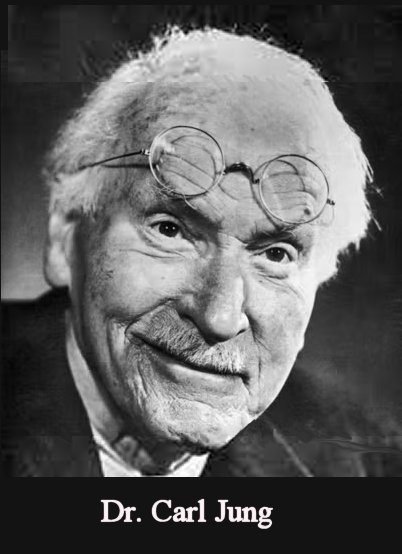 |
|
 |
Miracle
-
A surprising and
quite welcome event that is not explicable
by natural or scientific laws and is
therefore considered to be the work of a
divine agency.
-
A highly
improbable or extraordinary event that
brings very welcome consequences.
The Hidden Hand
of God
revolves around a
serious crisis in
my Senior year of high school, 1967-1968.
Due to several bad decisions on my part
compounded by some tough breaks, I had just seen my dreams of college go up
in smoke. Adding to my misery, I knew
my mistakes were directly
responsible for my cruel setback. Mired in depression,
I could barely make myself move. Full
of anger
towards myself for sabotaging my future, thoughts of suicide shadowed
me
like the grim reaper.
How was I ever going to escape the trap I was in?
This is the story of
the event that changed the course of my life.
To me, it was a Miracle. I will share
the tale and let you be the judge.
Rick Archer
|
|
|
|
1959, Age
9, 4th Grade
blackmail
|
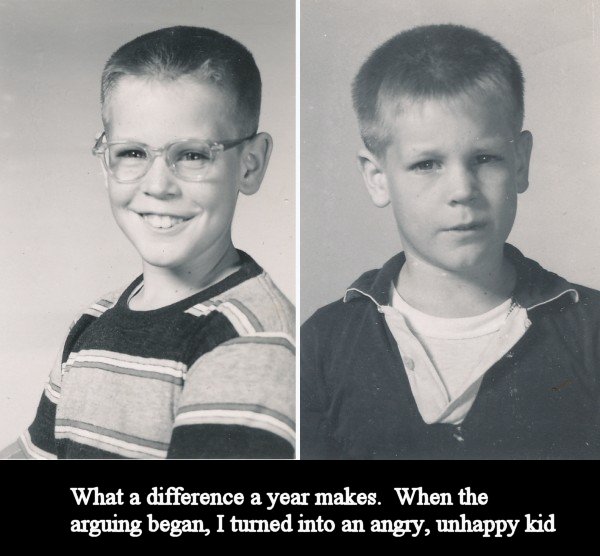 |
In order to understand
my Senior year trap, we have to go back nine
years to the
beginning. 1959 was the year I
started 4th Grade at St. John's, an elite private
school located in Houston, Texas. To
be quite frank, I had no business being at
this school. My admittance was what
most people would call a fluke. St.
John's is considered the top academic school
in Houston, perhaps the state. Due to
its reputation, SJS is exceptionally difficult to get into.
It is also very expensive. Given there was no possible way my father
could afford this place on his middle-class
income selling electrical equipment, what
was I doing here?
To be frank, I owed
my elite education to my father's mistress.
Should I thank her? Probably not. My life
had been pretty
good until the mistress came along.
Now I was miserable. I
was 9 when this woman's presence shattered my parents' marriage. For the past year, my
mother and father had fought like dogs
virtually every night of the week. My
father had asked for a divorce, but refused to
divulge the real reason (take a guess).
When my mother said
no, he decided to make her acutely
miserable.
His tactic was to criticize my mother in
every way possible as a lousy mother and
lazy housekeeper living a life of comfort while
he worked himself to exhaustion every day.
My father's
nasty tactics made
me crazy. Listening to them argue each
night, I turned into a sullen, angry,
insecure kid.
As an only child with no family friends or
nearby relatives, I had no one to turn
to. Forced to live alone in
this house of horrors, I became very disturbed.
Sad to say, I acted out in school.
My grades were mediocre and I
disrupted my 3rd Grade class so often that
my parents were called in.
|
Upset over my poor
grades and severe discipline problems, my
parents sent me to their psychiatrist. After testing me, the
doctor had a surprising suggestion. What
I needed was a stiff challenge. Send me to St.
John's and let the competition work its
trick. That is where his two boys
went and they thrived. Mom was for it,
but Dad was against it. Given my father's low opinion
of my intelligence, he was stunned when I
managed to pass the SJS entrance exam and
receive an invitation to attend. Dad
said forget it, there was no way on earth he
could afford the tuition. Let the kid
stick to public school where he belongs.
Mom was fed up.
They had been arguing for a year and
getting nowhere. Sick and tired of the
impasse, Mom stunned my father with an offer.
"Pay Richard's costly tuition for three years
and you can have your divorce." Dad
immediately balked. He would have to go
deep into debt to pay for this. Mom
countered with blackmail. "Jim,
I know about your mistress. I will
take you to the cleaners and ruin your life unless you
cooperate. Do the right thing for
a change and let's put an end to this bickering."
It turns out my mother
was bluffing. She had no proof, but
"knew" in that way women
sense things. Unwilling to stand up to
her threat to go scorched earth, my father
caved in immediately. For the next
nine years, St. John's School would become the
center of my life.
|
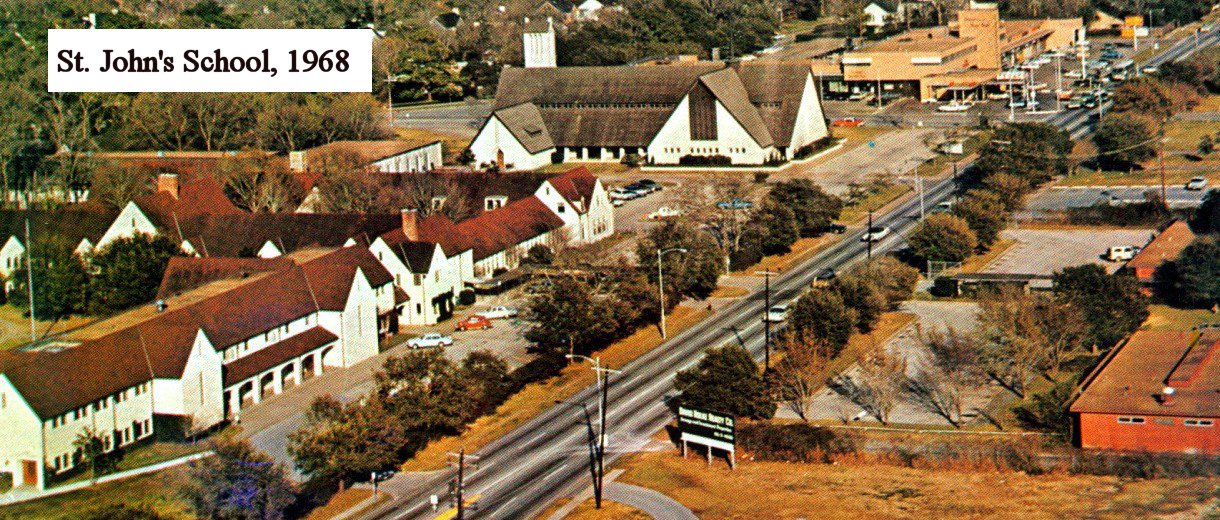
1962, Age
12, 6th Grade
CONSEQUENCES
|
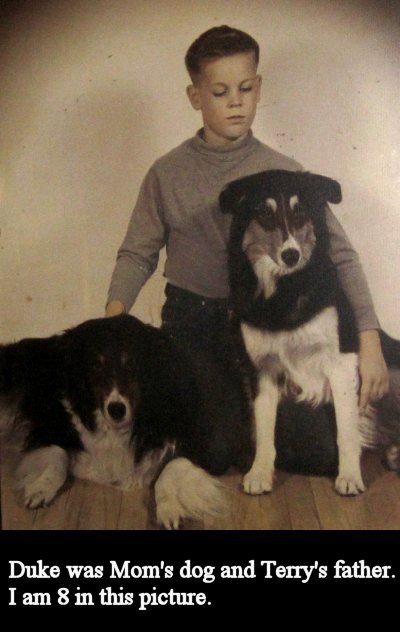 |
My father did not appreciate being blackmailed.
Feeling strong-armed into compliance, he turned his back on
me. My father was bitter over being forced
to pay three years of tuition far beyond his means. He
saw it as a disgusting waste of money despite the fact that
I did well academically (as the psychiatrist had predicted).
In fact, I never missed the Honor Roll once in nine
years. Equally upset was the mistress. As
promised, my father married her, but what she did not expect
was being forced to keep working in order to help my father
pay the SJS tuition. It galled her no end to realize
every cent she earned was spent on my behalf. Her
honeymoon was budgeted, there was no money
to buy
a house and they had to delay starting a family.
Infuriated, this shrew took it out on me. The
moment they were married, she constantly bickered over my
father's bad deal. Dad decided it was easier to
abandon me than stand up to his domineering wife. I
had
gained a school, but lost a father.
For the next nine years, St. John's would be my sanctuary,
the anchor which kept me glued together while my mother fell to pieces after the divorce. She quickly
remarried, a huge mistake. The new husband was an
ex-con with a fondness for
excessive drinking and
passing hot checks. He beat my mother several times
when he had been drinking. One night in desperation, Mom called my dog Terry for help.
One snarl from Terry put a
quick stop to the violence. As for the man's parenting
skills, he tried to get me hooked on cigarettes and stole my
cherished
silver dollar
collection to buy booze. One day the cops came looking
for him. Although the marriage only
lasted half a year, the misery continued due to my mother's
neverending penchant for
collecting losers and bringing them home to live with us.
You might think I am kidding. Guess again. This
went on for nine years.
In addition to my mother's bad habit
of picking up strays, she had trouble holding a job longer than a
year. My mother did not have a college degree.
When my parents married, she dropped out of college to
support my father while he got his degree. Her lack of
credentials cost her dearly in the job market.
Due to her frequent unemployment, the bills
mounted. One way to
solve the problem was to skip out whenever the
unpaid rent grew too high. We moved 11 times in 9 years.
The problems did not stop there. Every two months or
so I would come home to find the electricity turned
off. Or the water. Or the gas. I am fairly
certain I was poorest kid to ever
attend St. John's.
|
Given my mother's emotional problems,
she did not have much energy left over for me. With
many of her nights devoted to cruising the bars, I was
forced to take care of myself starting at age 10. Abandoned by one,
neglected by the other, I had no parent to offer common
sense advice on how to cope with my underdog status at the
rich kids school. Here is an example. I was consumed with envy
at my classmates' lives of privilege. It would have been nice to have a
parent willing to remind me to look on the bright side. Unlike a
lot of kids in this world,
I
never went hungry and I always had a roof over my head.
Plus I was getting a great education. Rather than appreciate what I did have, I grew bitter from
daily reminders of how much better my classmates
had it than me.
It was
obvious from my appearance that I came from a different walk
of life.
Although we all wore the same uniform at St. John's, one
look at my shoes was usually enough. My chipped tooth
removed any remaining doubt.
By definition, every child at my school was
well cared for. Best clothes, impeccable social skills,
contact lens, braces, chic haircut, etc. And
here I go with the chipped tooth, hair that sticks up
straight, cheap clothes, thick glasses, and eyes that don't
match due to my blind left eye.
Given that my mother was too broke to have the tooth
fixed for two years, it sent a clear message that money must
be short in my home. Starting in the 6th Grade I became low man on the social
totem pole. I was never bullied. Nor was I
insulted to my face. But I was ignored. The moment my privileged classmates
realized I wasn't one of them, it became
tough to turn acquaintances into friends. Academically
I belonged at SJS, but socially I was out of my league. Unable to play sports due to my
blind left eye and untrained in the social graces due
to my deplorable parents, I will be the first to admit I did
not fit in at this school. Over the course
of nine years I developed a severe sense of
social
inferiority. Although I appreciated my wonderful education,
I
hated my loneliness.
A
key event in my future Crisis took place at the end of the 6th Grade.
Dad's three years were up. No longer
legally
obligated to pay my tuition at SJS, my father told me his money was better spent
placed in a college
fund. Referring to this as his "College Pledge",
my father promised the money saved would be waiting for me
when the time came. Broken-hearted at being forced leave SJS,
I begged him to change his mind, but got
nowhere. Fortunately I caught a last-minute lucky break. Informed of my father's
decision, Mr. Chidsey, the Headmaster, took note of my good
grades and offered a scholarship. This explains how I
was able to attend St. John's for six more years till graduation.
|
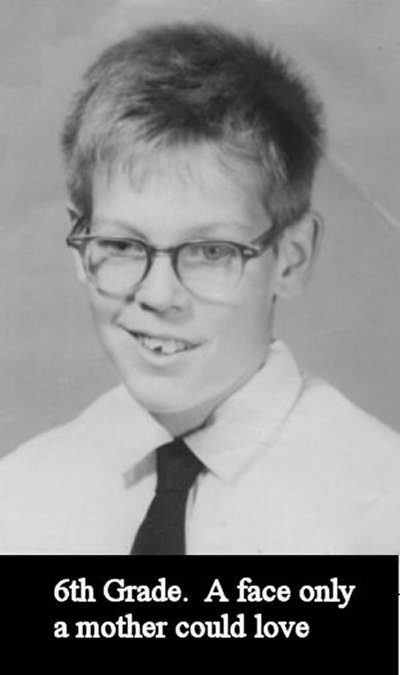 |
September 1967, Age 17, 12th Grade
SENIOR YEAR
CRISIS
MR. Salls
|
My
Senior year Crisis was not the product of
one particular event, but rather a
complicated series of
problems. The
first problem occurred in September 1967.
Mr. Salls was the new Headmaster, taking the
place of Mr. Chidsey. We
knew each other well. Mr. Salls had been my
German instructor for the past three years.
Although we never spoke on a personal basis, I could
tell he
appreciated how hard I worked in his class.
Mr. Salls
made it a point to meet with each Senior
early in the school year to
discuss college preferences. I
had my heart set on Georgetown University in
Washington, DC. My beloved Aunt Lynn
and Uncle Dick lived just across the Potomac
River in McLean, Virginia. I wanted to
be close to them. I had
been working as a grocery sacker after
school for the past two years. By the end
of my Senior year, I estimated I would have $2,000 at my
disposal. That was a lot of money back in
those days. That plus six years of
savings in my father's College Fund should
be enough to pay for Georgetown. Or so
I assumed.
For some mysterious reason,
during our meeting Mr. Salls completely ignored Georgetown
despite my explanation why this school was
my one and only choice. He insisted I
apply to Johns Hopkins University, a school
I had never heard of. The moment I
discovered it was a men's-only school, there
was no way I was interested. Due to my
sense of inferiority, I was already fearful of
rejection were I to ask one of the flawless
future debutantes for a date. A serious case of
teenage acne put a swift end to any
remaining courage. Given that I never
had
a
single date in high school, the thought of
going to a men's school was out of the
question. Sensing my reluctance, Mr.
Salls took the extraordinary step of asking
me to apply to Hopkins anyway as a favor to
him. I agreed to do so, but why was he
bullying me?
I was
very angry at Mr. Salls when I left his
office. He had made me promise to
apply to a college I had no interest in.
The thought of wasting $75... two weeks of
work at the grocery store... on a senseless
application fee made me sick to my stomach.
It was standard procedure for my classmates
to apply to ten schools, maybe more if they
felt like it, but that was Daddy's Money.
This $75 was coming
out of my own thin pocket. I was so bitter
that I unwittingly made a serious mistake.
I had intended to apply to the University of
Texas as a backup option. However, to
save money, I said to heck with UT.
Using the money to apply to
Hopkins instead, four months later I would deeply regret
this decision.
|
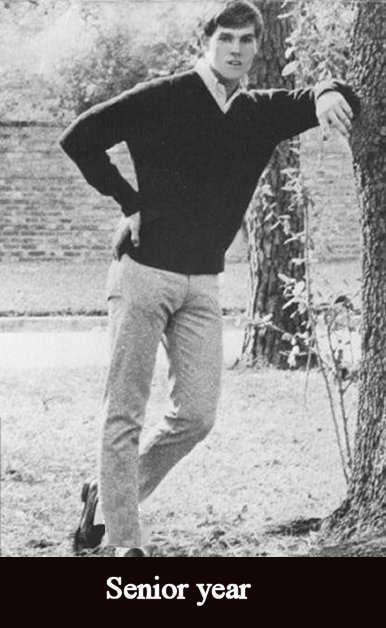 |
NOVEMBER 1967, Age
18, 12th Grade
SENIOR YEAR
CRISIS
little Mexico
|
In addition to my
error regarding the University of Texas, in
the coming Spring I made a second error that
would cost me
dearly (we will get to that shortly).
In order to make this error, I had taken
complete leave of my better judgment.
Perplexed by my uncharacteristic
recklessness, why would I make such a
mistake? The best explanation was
extreme stress related to an
idiotic move on my mother's part. This
is the story of 'Little
Mexico'.
Late in my Junior
year, my mother finally found steady
employment in Houston's famed Medical Center.
She decided to buy a ramshackle house in a
largely Hispanic part of town. Mom
wanted to move here as a way to make her
Mexican boyfriend Ramon more
comfortable. Given her shabby
credit history, I have no idea how she persuaded a bank to
loan her the money.
Say what you will
about my father, but he deserved credit for
his reliability on child support. He
never missed a payment and was always
on time. My mother and I were
extremely dependent on this money. Its
appearance would allow us to get the lights turned back
on or make a much-needed visit to the grocery store.
In November 1967, for the first
time in eight years, Dad's monthly check failed to appear.
This was serious. Without my
father's child support, my mother could not
afford to pay her house note.
My mother was so
confused, it took two days to realize
what was wrong. When
she bought the house, my mother had assumed
my
child support would continue until I
finished high school seven months down the road.
However, my father had not sent a check
for November because he
was no longer legally obligated to pay child
support after my 18th birthday in October.
|
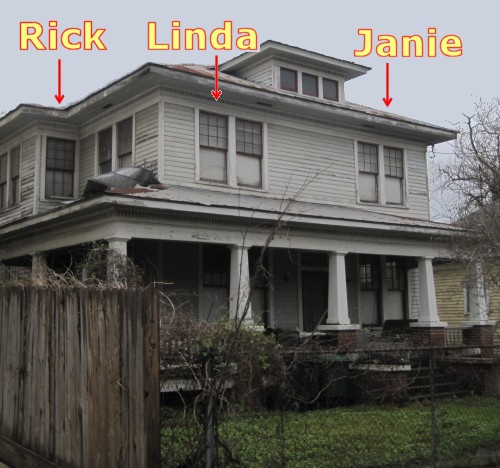 |
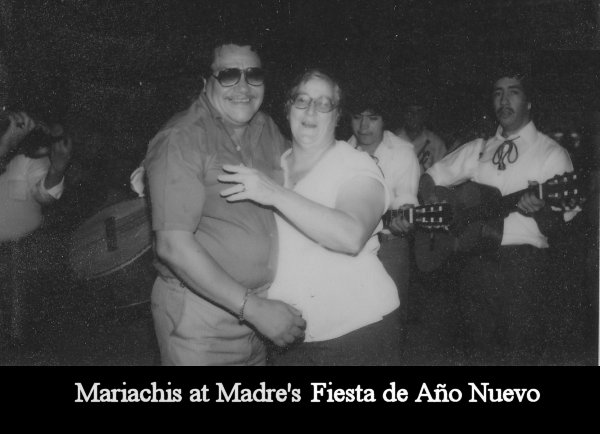 |
Uh oh. My panic-stricken
mother had made a colossal blunder. Well aware
she had purchased this house with
no margin for error, my mother should have
had the sense to anticipate this child
support problem. Too late now. I
offered to make up the difference with my
grocery store money, but my mother said no.
Without telling me, she had already cooked
up a wild scheme. My
mother's solution was to invite Janie and
Linda, Ramon's younger sisters, to come up from
Mexico. They were expected to get jobs
in one of the nearby cantinas and pay rent.
One night I
came home to find two
young women had moved into the bedrooms next to mine.
Surprise Surprise. Within two weeks, Janie and Linda had
boyfriends. My mother gave their
boyfriends permission to come live with us
as well, a decision that included Enrique's
2-year old boy Manolo.
I was never consulted, probably because my
mother knew I would scream bloody murder.
Keep in mind I had grown up an only child
accustomed to silence. Suddenly there
seven other people in this house besides me.
This included my mother and six Mexican immigrants, none of
whom who spoke English. Given their fondness for loud
Ranchero and Mariachi music, the place was a
madhouse at night. The ensuing culture shock turned my world
upside down. College could not come
soon enough.
|
JANUARY 1968, Age
18, 12th Grade
SENIOR YEAR
CRISIS
the Jones
scholarship
|
 |
At the turn of the
20th Century, a visionary named Jesse H. Jones
proposed turning Houston's slow-moving Buffalo Bayou
into a world-class ship channel. It
was a brilliant move. The massive
widening process was completed in time
to allow ships from the new Panama Canal to
visit. Shortly after that came World
War I with a massive demand for oil.
Thanks to the Texas Oil Boom, the Houston
Ship Channel exported tons of barrels
overseas. This is how Houston became
the Energy Capital of the world.
Now a very rich man,
Jesse Jones looked to his legacy by creating
a scholarship fund. Every year one
graduating Senior from each Houston high school would receive a $4,000 stipend
($1,000 per year for four years). I
counted heavily on winning this award.
In addition to my good grades, I assumed
my status as the poorest kid to ever
attend SJS guaranteed I was a
shoo-in. However,
I was worried
something was wrong. It was January
and so far no one
from St. John's had mentioned this
scholarship to me. The winners would
be announced in March, so I was troubled by the lack of contact. I
should have asked
someone, but I was acutely introverted at
this time in my life.
As a result, I remained completely in the
dark.
|
I was also worried about my father's
College Pledge. According to him, for
the past six years he
had placed money equivalent to the
annual SJS tuition in a college fund. If he had done what he
promised, there should be about $10,000
waiting for me. However, when I saw
my father for lunch shortly before Christmas,
he did not say a word.
Considering college was just around the
corner, why was the important subject
of college finance bypassed? Bottom
line, I did not trust him. This is why
I had gotten my grocery job two years ago.
Back in September when I substituted Johns
Hopkins for the University of Texas,
I did not know state tuition at UT was
dramatically
lower than private college tuition.
I admit this level of naivete is tough to
believe, but
who was going to tell me? My
non-existent Padre? Yeah, right. Or Mariachi Madre? I was so angry
at my mother for "Little Mexico" that
we weren't speaking. Adding to my
problems,
I was
what you would call a loner. An only
child stuck with an erratic mother, keeping
to myself had become second nature long ago.
Due to my limited social skills and tendency
towards introversion, friends were few and
far between. Although I was pretty
good at book learning, things other people
took for granted like knowledge about college tuition and
how to find a girlfriend fell by the
wayside.
Due to my ignorance,
as of
January 1968, I was stuck with only two options,
the
prohibitively expensive
Georgetown
and Johns Hopkins. Ignoring
Hopkins, I focused on Georgetown. Including room and board,
it would cost between
$20,000-$24,000 to attend Georgetown over a four year period.
This was such a staggering amount, I worried
day and night whether my father would come
through for me as promised.
As it turned out, I did have one friend at
St. John's. David and I liked to play
chess at lunch. One day I got into a
serious discussion with David about college
finance. I stopped breathing when
David told me his brother went to
the University of Texas where tuition was $1,000 per year.
I gasped. $1,000 per year?
Georgetown was $5,000
a year!!
Unbelievable. I was so upset I nearly
had a heart attack. Why didn't anyone
tell me this back in September?
Considering how worried I was, this bad news was more
than I could handle. If I had applied
to the University of Texas as my backup
option, I had enough
grocery store money to pay for the first
year at UT out of my own pocket. Even
better, if I won the Jones Scholarship and
got a part-time job, I had enough money to
attend UT for four years without depending on my father.
Only one problem. It was too late to
apply now.
Unless I could find a way to pay for Georgetown,
I would be forced to miss an entire year of
college. Given how badly I wanted to
escape Little Mexico, this thought left me
devastated. Right now I was very angry
at Mr. Salls.
Why didn't Mr. Salls tell me how inexpensive
tuition was at a state school when we met in
September instead of wasting my time over
this stupid Johns Hopkins school? My
misery did not stop there. When I
suggested I
could probably get a
scholarship to Georgetown,
David threw me a
wicked curve
ball. To
my alarm, David warned me not to get my
hopes up. David informed me that
scholarship money was based on need.
"Yeah,
so what?" I said. "My
father doesn't know I exist and my mother is dead broke. I definitely
qualify."
"Rick, I hate to
be the one to tell you, but your father
makes too much money. His
substantial salary will be a deal breaker."
The recent years had been good to my father.
He was now one of the top electrical
engineers in the country. For example,
he designed
electrical systems for giant cranes such as
the one used by the Space Center at Cape
Canaveral to launch rockets and space capsules.
"I don't understand,
David. I don't live with my father."
"That is
true, but he retained his parental
rights, so Georgetown
will expect him to be responsible.
They will take one look at your
father's salary and expect him to pay."
"What if he refuses to pay?"
"Why would
he do
that?"
"Lots of reasons. My
stepmother would murder him if he spent one
extra dime on me. As it stands, he sends my half-brother and
half-sister to private schools that are just as
expensive as St.
John's and pays full tuition. He
claims money is tight. That's his way
of saying don't expect further generosity beyond
the College Pledge savings. I assume I
will get whatever is in the College Pledge
and that's it. Furthermore, I can't imagine my father would
cooperate in filling out financial aid
forms. How do I explain to
Georgetown that my
father refuses to help?"
"I don't know,
Rick. But I know Georgetown won't
give you a scholarship if your father
doesn't play ball with them. Why
should they take your word for it? It sounds to me like you
better hope your father was serious
about that College Pledge."
|
february 1968, Age
18, 12th Grade
SENIOR YEAR
CRISIS
THE college pledge
|
Following my
conversation with David concerning financial aid, over the next
month I was filled with overwhelming
anxiety over my father's promise to pay for college.
Not a day passed without that awful feeling in the pit of my stomach
that I might miss out on college next year unless Dad agreed to
help.
One day in late February the school receptionist gave me a message
to meet my father at the usual time and place tomorrow.
I was on pins and needles as
I drove my
car to the
coffee shop. Surely he was good for his word. Why else
would he set up today's meeting? This was it. This was
the moment I had spent the last six years waiting for. Today I
would learn the truth about my father's College Pledge. I was skeptical and hopeful at the same time. Over the past nine years,
Dad had disappeared from my
life. Although his office was only a mile from my school, Dad
preferred not to make time for the forgotten child. Dad's idea
of fatherhood was "Don't call me, I'll call you." I had been
told not to call unless it
was an emergency.
At best I saw him for lunch a couple
times a year.
I was no fool. I knew he didn't care.
However, all would be forgiven if he would just
come through for me today.
As I walked
into the coffee shop, my heart was pounding. I prayed Dad
had put that money into a savings account as promised.
If so, the nightmare of how to pay my Georgetown tuition would be over and
I could finally calm down.
The phrase 'hoping against hope' was coined for
this
situation. Would the father I always hoped for show up today
or would the father he had turned into appear instead? I expected
the latter, but you never know, maybe the man would come through.
I recalled his solemn promise from six years ago.
"Rick, I
know how much St. John's means to you, but paying for college is
so much more important. This money will be there for you when it
is
time."
Dad
was waiting for me in the reception area at the coffee shop. He stood up and
greeted me with the biggest smile on his
face. He shook my hand and gave me a big hug. Hmm. When was
the last time my father hugged me? This was a good sign. Maybe there was hope after all.
A waitress escorted us to a booth
and
we sat across from one another. As our eyes locked, I could barely
breathe. Six years I had waited for this moment. The tension
was unbearable. When I saw
him start to fish around inside his coat, I froze. This
was it.
Dad found what he was
looking for. He placed four $100 bills
on the table.
|
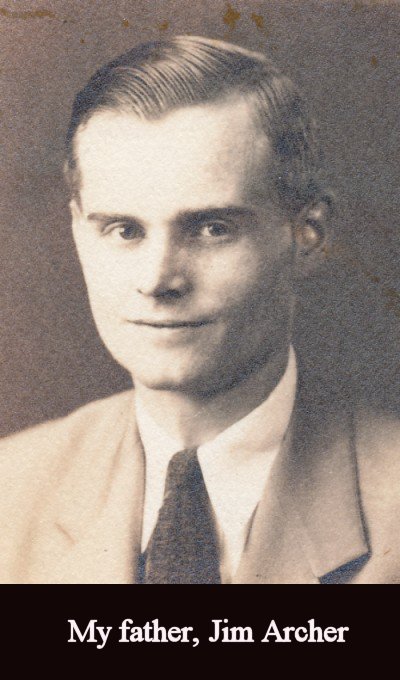 |
 |
My eyes bulged.
Staring in horror, did this mean what I thought
it meant?
"Dad, what is this
money for?"
My father
beamed with pride.
"Look, Rick, it's Four Hundred Dollars!
This is the money I've been saving for your college tuition!
I promised you long ago I would help.
I told you I would help you pay for college and I meant what I said!
This money will help you go to college!"
I was stunned. Staring at the money in disbelief,
Dad's $400 would barely put a dent in Georgetown's $20,000 price tag.
Oh my God, my worst nightmare had just come
true. This was the father I had expected all along. I
turned white as my chances of going to college next year seemed ever
so remote. Even if I won the Jones Scholarship, the annual
$1,000 stipend did not come close to make up the difference. Stunned by the realization I
probably would not be going to college in the Fall, I could not
breathe.
|
If my father saw how
upset I was, he did not show it. In fact, my
father was grinning like the Cheshire Cat. I was
bewildered. What in the hell is my father so damn happy
about? There he was,
sitting across the table
beaming with triumph. Dad was so pumped over his good deed, he
looked like he was ready to don an Indian war bonnet and dance
in the aisle, war whoop and all. What is wrong with this man? The way he was grinning
from ear to ear, you would think Dad had just won the
goddamn Father of the
Year award.
I shook my head in
disbelief. What could
this man be thinking?
I knew my father was a born salesman, but even Dad had to know he was
stretching things here. Oh lord,
just look at him! My father
was as proud of himself as he could
possibly be thanks to his amazing 2% contribution
to my college fund. I could not believe my father was doing a
victory celebration over $400.
Just then I wondered if Dad
was playing a joke on me. Maybe he was pulling my leg.
Was he hiding more money in an attempt to build the
suspense? If so, it was working. I was so tense I could
hardly stand it. Suddenly hopeful, I peered at him for clues. But
then I remembered this was not my father's way. Dad did not
have a sense of humor. Sure enough, the moment he noticed my frown, he replaced his Happy
Face with his Let's Get Down to Business Face. I had my answer. This
was it. Sick beyond sick,
I stared long and hard at my
father. They say moments from your life pass through your mind in
times of crisis. The image that came to me was the vision of my
mother and father arguing over sending me to St. John's during their
divorce process. I knew my father was totally against it. Hiding behind a
doorway to listen in, I remembered what my father had said on the day I
was accepted at St. John's.
"Jesus Christ,
Mary, that
psychiatrist is an idiot.
What makes him think a boy who made D's on his report card
can handle academics at the toughest school in the city? Our son can barely
hack it in public school, so why should I spend all this money
when we both know he will be demolished at St. John's?"
My father had good
reason to feel that way. After my lackluster performance in public school,
Dad assumed competing head to head with the best and brightest
would be too much for me. However, just the opposite had happened.
As the psychiatrist had predicted, the academic challenge was exactly what I needed.
Although I
had to study my butt off to keep up, I thrived on the challenge of proving I could
hang with all these smart kids.
If ever there was money well spent, this was
it.
What a remarkable difference St. John's had
made! St. John's had brought out the very best in me.
From an underachieving child in public school, I had been encouraged
to reach my potential. I would have never made it through the past nine years
without the support I got from my gifted teachers. Indeed, my
education was the one bright spot in an otherwise miserable
childhood. From my point of view, St. John's had worked a small miracle.
One would think my
father would be thrilled at how well things had turned out for his
son and wish to honor his College Pledge promise. But
apparently not.
Not once in nine years had my father
ever acknowledged the value of my school. Too dumbfounded to speak, I gazed in shock at the money
laying there. I
had planned on getting nasty with him if he disappointed me, but
here at crunch time I was far too introverted to confront him.
Even though I
physically towered
over my soft, pudgy father, psychologically I was a
dwarf in his presence. I hated myself because I didn't have the guts to
chew him out. For six years, I had vowed
to
speak up if he stiffed me. So much for false bravado.
Before I could summon the courage to protest, my father took advantage
of my silence to pump another nail into my coffin.
"I'm sorry, son,
but right now my money is tied up with sending Joy and Charlie to private
school. Unless I get a raise and things dramatically improve in
my
finances, this $400 will be
my only contribution towards
your college education."
No surprise there. I was already so numb, this news
didn't affect me all that much. I guess I had already
anticipated he would say something like that. The disgust I felt was overpowering.
In addition,
I was paralyzed with disbelief. How was it possible to have the lowest expectation
for my father yet have him out-perform the worst thing I could
imagine? I am not sure why, but for some reason the $400 stung
even more than no money at all. The thought that my father was
proud over $400 infuriated me. Is that the best he could do
after six years? Good grief, even my mother could do better than
that and she was destitute. As
the spirit drained out of me, I was disappointed beyond comprehension. I
wanted to chew him out, but what good would it do? Feeling
my anger grow, I was fearful of losing control. Realizing I
was about to lose my temper and start screaming at him, I could not
sit here any longer. I
reached over to pick up the $400. It made me sick to touch
the money, but
despite my wounded pride, I needed
whatever I could get.
Unable to be civil any longer, I stood up and said, "Thanks, Dad, but
I've got to go. I have a test to study for."
I stormed out of the building and
threw the money on the passenger seat
in disgust.
I seethed
over this
brutal insult as I
drove away in my used VW Bug. Suddenly without warning, my anger vanished. It was replaced by
grief. My father's broken promise was more than I could take.
Beneath the anger
and disappointment,
I was very
hurt. In that moment, any remaining illusion as to
my father's concern for my welfare died.
|
The sad thing is that
I half-expected something like this would
happen. Some sort of eerie premonition had warned me
about today. I didn't see this dread as psychic
foretelling, but rather that my subconscious knew my father
better than my conscious mind wanted to admit. Well,
not any more.
The problem was that my father had his
"Caring Act" down to a pat.
I met with him for lunch three or four times a year
over the past nine years.
Dad was always friendly, always affable, always glad to see me.
However, today's cheap trick had opened my eyes. It was all a
disguise. Before he began designing electrical systems,
Dad had been an excellent salesman. I suppose Dad's sales
training paid off. When you only see your kid
three times a year, Dad could fake sincerity
to perfection.
My father had
once loved me. I knew this for a fact. But ever
since he met the mistress, his love had mysteriously
evaporated. Did I do anything to deserve this?
No. For the past nine years I had been unfailingly polite and respectful. Grateful for any attention he was willing to
share, I never gave my father a bit of trouble. Now after six years of
wondering, today's betrayal revealed for certain what kind of man my father was.
|
 |
As I drove back to
school, I could not stop glancing at the $400 on the passenger
seat. Seeing those four bills stare back at me like a Betrayed
Kingdom, I felt so worthless. Most fathers would be proud of a boy who got
straight A's, bought a car with his own money, worked 20 hours a
week after school and never got
into trouble. Not my father. Six years ago my
father stopped paying for St. John's because in his opinion it was a
waste of good money. Now he claimed there was no money for me because his
abundant salary was
better spent sending Joy and Charlie to private school.
Hey Dad, do you want to explain why private schools are okay
for them, but for not me? Seriously, my father had to be the biggest hypocrite to ever
walk the earth.
This was the day my father broke my heart.
|
FEBRUARY 1968, Age
18, 12th Grade
SENIOR YEAR
CRISIS
EVERYONE BUT ME
|
Prior to my
Senior year, St. John's had
been my sanctuary. For the past
eight and a half years, my school was the only
thing I had going for me. In particular, I
could point to several teachers who had gone out
of their way to offer counsel and encouragement.
However, when I returned to class after my father's
betrayal, I
began to hate my school with a passion. It was a
classic case of misplaced anger.
The moment I
walked into German class,
the phrase 'everyone but me' starting playing in my brain
on endless loop.
By reneging on his College
Pledge, my father had left me with no way to pay
for Georgetown. Unless I caught some sort of break, next year every
classmate BUT ME would attend college. The more I thought about
it, the more
upset I became. In the history of St. John's dating
back to 1946, only four graduating Seniors had
failed to go to college, all girls.
Legend had it they were getting married, so why
bother? Easy to adopt that attitude when you're rich, but what
about me? As things stood, I stood to become Number Five, a dubious honor.
Taking a desk in the back of the room, I was
so upset I was in tears. Mrs.
Anderson asked us to translate
a long paragraph of German into English. Since German was my best
subject, as usual I finished first. However,
this time it was for
the wrong reason. My heart wasn't in it, so I gave a brief effort and quit.
So what? Since I wasn't going to college next year, what was the
point of trying?
|
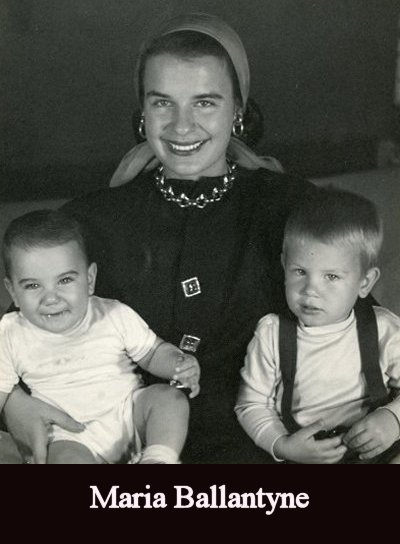 |
I felt so
utterly hopeless. With nothing to
do, I surveyed my twelve classmates and wondered what
college they would attend. I started with
Katina Ballantyne. In my opinion, Katina had the best mother
in the school. Over the past nine years, I had
watched Mrs. Ballantyne mentor her seven children in the
hallways many times. Like Katina, every one of them
was a class leader. I was convinced the success of the
fabled Ballantyne clan was
directly related to their mother's brilliance.
I also watched
Mrs. Ballantyne dominate the
afternoon Mother's Guild conversations. The Mother's
Guild was a group of SJS mothers who met several times a
week to plan parties after home football games, proms, book fairs, fund raisers and
social events. Conducting their affairs in plain sight
in the Commons Room, Maria Ballantyne was invariably a
fixture in the
center. I considered her the most influential parent
in the school.
My hero worship
began in the 4th
Grade, my first year at SJS. Following the divorce, I was
incredibly insecure. My mother's nutso marriage to the abusive alcoholic caused me
great anguish. So did her
manic-depressive behavior.
Seeing
her racked with sobs, there
were times I actually worried she might kill herself.
Other times I feared she would end up in the loony bin and be
unable to care for me. That was my biggest fear.
Just the thought of being forced to live with the mistress would be enough to scare
the wits out of any
kid. Due to my increasing
lack of confidence in my own mother, I wondered
what other mothers were like. Enter Maria Ballantyne.
I noticed her poise. I saw the respect given by her peers. I took note how her
seven children gravitated to her.
Since I was a near-orphan, how could I not be attracted to such a caring, energetic
mother?
Given my troubled
home, I had no reason to apologize for my admiration. I was a sad, unhappy
10-year old who meant no harm. Furthermore, due to my respect for
her privacy, not once
during my nine years at SJS did I approach Mrs. Ballantyne in any way. All I
did was watch from afar. I would stand unnoticed in a corner and wonder
what I could accomplish if I had someone like her for a mother.
The thought of having a caring, effective mother to motivate and
advise me was a tempting fantasy to be sure.
|
Every one of
the seven Ballantyne children were a credit to their
parents. They were smart, athletic, and outgoing.
Greatly respected by everyone, they were named captains of
their sports teams and voted as Prefects by the student
body.
Katina was the perfect example.
A cursory glance at the 1968 yearbook said it all. Katina was
all-conference in field hockey and captain of the
volleyball team. She played lead in The Music Man,
she was a Prefect, she was in the choir, she was editor of
the yearbook. I would venture to say Katina was the most
respected young lady in our class. Katina was an honor student
as well.
Despite
all this success, Katina remained level-headed and even-tempered.
Extremely popular, I never once saw a streak of meanness or pettiness. There
were no airs or snobbery emanating from this young lady.
Furthermore Katina's brothers and sisters were the same way... talented,
generous, humble, no hint of arrogance.
I watched
Katina for the same reason I watched her
mother... I admired both of them.
Unfortunately,
following my father's snub, I caught myself
staring at Katina filled with
bitterness for the first time. I did not want to dislike
Katina; she was a sweetheart. But I
could not help myself.
Katina's father was a prominent doctor. He was the first
person hired when
famed
cancer research center M.D. Anderson
opened its doors. I resented Katina because she
had come to school today secure in the knowledge her
father's lucrative profession would send her to the college of her choice.
The same was true for the other eleven students.
My classmates did not give college finance a second
thought. But what about me? My
father's broken promise meant there was a good
chance I would not be going to college next year. I was
incensed over the injustice. Who at this school has worked harder than me?
Who needs college more than me?
The
thought of being trapped at Little Mexico
for another year was more than I could
handle. Given the unfairness of it
all, my father's snub sent me reeling.
Everyone but me...
|
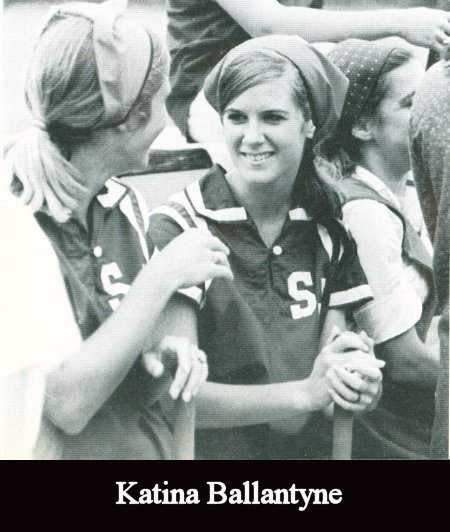 |
MARCH 1968, Age
18, 12th Grade
SENIOR YEAR
CRISIS
COLLAPSE OF
MY BETTER JUDGMENT
|
In the
words of Jim Morrison, "Women seem wicked when you're
unwanted, Faces look ugly when you're alone."
Following my father's betrayal,
my bitterness increased daily.
I was tormented every waking
moment with the thought that my classmates went to
bed at night dreaming of fraternities and sororities
while I would still be sacking groceries next school
year.
I hated myself, I hated my
father, I hated my mother, I hated everyone. It was me
against the world and the world was winning.
I could not bear the thought that every student
in my Senior class
had parents willing to take care of their children's college education.
My father's
broken promise was bad enough, but the knowledge that I
meant so little to him hurt even worse. Other than
my friend David, I told no one what had happened.
I brooded day and night over my miserable fate.
They say Depression is caused by anger turned inward.
That's probably true.
Unable to express my rage towards my father, my mind became
twisted badly out of shape.
|
The
trigger for my terrible mistake came Sunday
night two weeks after my father's bad news.
I was
upstairs studying for my Monday German test when I heard my
dog Terry yelp in pain downstairs. I was instantly
alarmed. Terry was getting older and
was increasingly fragile. Terry's
cry
was quickly followed by loud wailing from the two-year
old boy who lived with us.
I raced down the
steps
at the same time as the boy's father came tearing out of the
kitchen. I did not see what happened, but my guess
is the boy had pulled Terry's leg. No doubt Terry's cry
of pain had scared the kid, causing him to holler
in fear. Already upset that Terry had been hurt, I
was incensed when the boy's father had the nerve to accuse
my dog of biting
the kid. Since he spoke in Spanish, I didn't
understand a word he said. However I got the message.
Now joined by the four other adult Mexicans,
they all took the
father's side and glared at me as if this
crying baby boy was my fault. Considering the powder
keg of anger inside me, I was ready to tear
the father to pieces when Mariachi Madre appeared just in time to separate us.
|
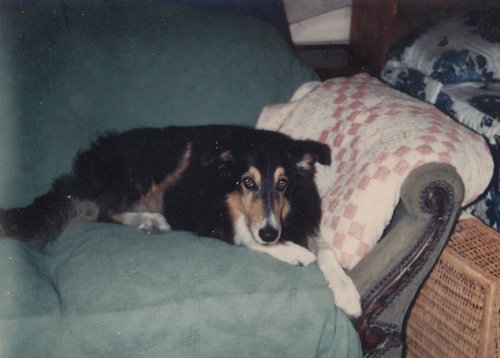 |
Furious
that Terry was
being blamed, I raised my voice and told
my mother,
"Terry didn't bite that kid. There's not a mark or red
spot on the boy. I
say that little brat hurt Terry."
With the child screaming like a
banshee and
five angry Mexicans glaring at me with hostility, my mother barked, "Richard,
for once can we please skip the argument? The kid will
live. Take Terry
upstairs and be done with it."
Given the language barrier and lack of
a witness, what was the point of
arguing? I decided to cooperate, but that didn't mean
my anger was going to subside. Seething in my
bedroom, I found
myself unable to resume studying for the German test.
I was so angry at my mother for this ridiculous Little
Mexico situation, I was ready to burn the house down. Realizing it
was futile to control my anger, I closed the German book and
took Terry for a long walk instead. A very long walk.
The thought that there was a strong chance I would still be
living here next year was more than I could bear. When I
returned,
I was too depressed to study, so I went straight to bed.
Unprepared for my
German test, I called in sick the next day. Call it a
mental health day, something I badly needed.
Mercifully, the house was quiet for a change.
I opened my German book and began to study.
Unfortunately, I was still upset about last night.
That is when I hit a roadblock. 20% of the test
required a type of memorization I resented. I had no
trouble memorizing vocabulary, but I drew the line at memorizing the names of famous
German authors plus their widely acclaimed books. Wolfgang Goethe, Hermann Hesse, Thomas Mann,
etc.
The
irony
is
that
I didn't have anything against learning about these people.
Indeed I had enjoyed our class discussions about these men.
This was like English class where we discussed philosophy and
other interesting ideas. Friedrich Nietzsche was my favorite
due to his deeply cynical views of life. However, in my opinion, this
was not Language, this was Literature and I saw no need
to be memorize it. That is what encyclopedias are for.
If they wanted to test us, better to have us write an essay
in German about one of the men. Bitter, I decided to cheat on this
particular section, but take the rest of the test the
correct way.
I readily admit I was
not thinking straight. However that's what happens when you
are mad at the world. My father's broken promise was just the
tip of the iceberg. Right now the animosity
I felt towards my mother over her
ill-advised decision to turn the house into Little Mexico had robbed
me of any remaining patience. I was
worried about college, I
wasn't sleeping well, I didn't have an appetite, my dog had just
been hurt and
Little Mexico was a constant source of irritation. It was impossible to study over
the loud music and shouting voices.
Furthermore, how did they treat my vulnerable dog when I wasn't
home?
|
They say
overwhelming frustration causes self-destructive behavior.
No argument from me. When you can't hurt the person
you are mad at, you hurt yourself instead. All that
anger has to go somewhere.
The stress I felt was so oppressive, I snapped.
Since the world had been so unfair, the injustice of it all entitled
me to do whatever I wanted. I decided I had every right to
make a bold statement and cheat on the Literature section of my
German test.
"I, Rick Archer, hereby
declare I am entitled to skip memorizing stupid stuff I will never need later in
life."
It did not matter that no one would hear my protest.
I would do this for no other reason than to be
perverse.
|
 |
MARCH 1968, Age
18, 12th Grade
SENIOR YEAR
CRISIS
THE DECISION
TO CHEAT
|
As expected, during
German class on Tuesday Mrs.
Anderson told me to meet her
later this afternoonin
in this classroom during
my Study Hall period. I liked Mrs.
Anderson. Always cheerful and very complimentary
of my work, she was one of the many fine teachers who
went out of their way to offer support.
I knew Mrs. Anderson liked me.
Not only that, I was one of her best students.
For this reason she trusted me.
At lunch time, I
decided to cover my bet. What if Mrs. Anderson changed her
mind and asked me to
take the test in Study Hall instead? I
would not dream of cheating in Study Hall with all those prying
eyes. My scheme depended on being totally alone in our German
classroom. Just in case, I
briefly studied
the information anyway. In other words, I knew enough to get most of it
right without cheating. As it turned out, I made 95 on the
test. Had I not cheated, I would have made a 90. In
other words, this elaborate farce was worth 5 points. But
making a better grade was not the point. I was cheating as a
form of protest, a chance to thumb my nose at a cruel world.
Besides, there was no way
on earth I would ever be caught, so who cares what I do.
When I got to the
classroom around 2:30 pm, Mrs. Anderson was waiting. Handing
the test to me, she said, "When you are done, just drop it
off at the office." Then she left the room.
Convinced she
would not
return, I decided to go through with my protest.
As I took my test,
I sat alone behind a
windowless closed door.
Our classroom was
located upstairs in the most deserted corner of the school.
Since there was no hallway, there was no passing traffic
to worry about. Nor would anyone visit the room at such a late hour. Mrs. Anderson had
indicated she wasn't coming back, so I had nothing to worry
about. Besides, in the unlikely event someone came up the
noisy wooden stairs, I was certain to hear them approach.
|
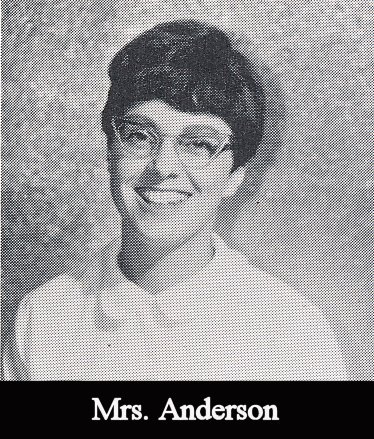 |
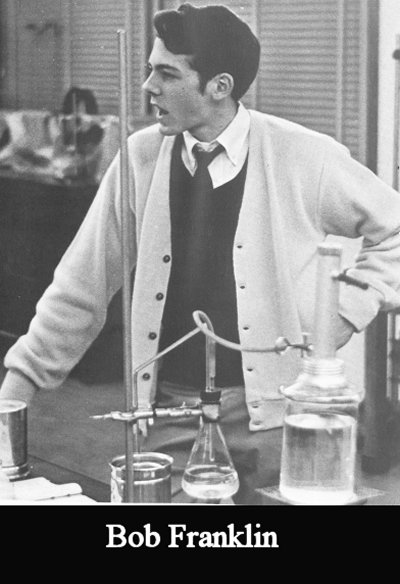 |
30 minutes
passed without a sound as I took the test. I
handled the vocabulary and translation segment without problem.
Now that I had finished the Language part of the test, I turned my
attention to the Literature section I objected to.
Okay, this is it.
First I answered the
questions I knew the answer to. Then I pulled out my book and
began to copy the five or six names I did not remember. It would take two minutes to
finish.
20 seconds after
I opened my
book, a classmate named Bob Franklin threw open the door and walked
in. Oh my God, what is he doing
here!?! No warning, no knock, Bob just burst in.
Had I heard Bob coming
up the stairs or if he had knocked before entering, I could have
closed my book ahead of time. No such luck.
His sudden entry caught me
red-handed. However, although my book was wide open, maybe he wouldn't notice.
Praying he would assume I was doing homework, I did not touch my
textbook.
Bob froze the
moment he saw me. By his startled expression, I could
tell Bob had no idea anyone was in the room. Embarrassed at interrupting me, Bob apologized.
"Rick, I am so
sorry to barge in like this! I'm sorry I didn't knock. I didn't
know you were in here."
"Uh, it's okay,
Bob,"
I stammered. "What are you doing here?"
"I was in Study Hall
with German homework, but I couldn't find my book.
The last place I saw
my book was in this room during
German class earlier today."
I was sitting near the desk Bob was headed to.
Sure enough, I saw his book nestled in the storage space below.
As he approached, I had no
choice but to
discretely close my book. Dumb move. Noticing what I did, Bob made sure to pass right by me.
When he saw the test on
my desk, his expression changed in a flash. Based on his
puzzled look, Bob was
not sure what he had seen, but it didn't look right. Bob did not say another
word. He grabbed his missing book
and
swiftly left the room. I sat there stunned. I did not know if Bob
would report me, but I definitely did not like the look on his
face.
|
Oh my God, what have I done? So much
for the Faith and the Virtue, the school motto.
My
Virtue was in short supply today.
Given that this was a serious violation of
the SJS Honor Code, how would I ever forgive myself?
And what price would I have to pay?
Deeply shaken, I finished the test, then sat
there trying to make sense of what had just
happened. I was beyond
incredulous.
There was not one, but two coincidences in
play here. Both
were off the charts. What were the odds that Bob
would forget his book on the same day I would take my
makeup test in this room? Remote. What were the odds
he would walk in at the exact moment to catch me?
Astronomical.
Bob's split-second timing
could not possibly have been more
devastating.
I
assumed Bob had been doing homework in Study
Hall. Unable to find his book, he
checked out of Study Hall to retrieve it in
our classroom. Catching me at the
worst possible moment,
I
concluded my calamitous downfall was
a near-impossible event given
the laws of probability.
Oddly enough, I was more concerned
over the Supernatural overtones of this event than I was
regarding my certain punishment. To me, there
seemed a distinct possibility that this was a clear-cut
case of Divine Intervention. I strongly suspected
God had intended to teach me a lesson.
|
 |
 |
Let's take a closer
look at the circumstances. I had been completely alone in an upstairs room in the furthest, most distant corner of the school. There was at most a narrow
two, maybe three minute window for someone to catch
me. No one but Mrs. Anderson knew I was in there and she didn't
care. Did Mrs. Anderson send Bob to check on me? No way.
The look of surprise on Bob's face when he walked in
was genuine. Furthermore, why would I
even have been under suspicion? I
was an Honor student and German was my
best subject. I had never cheated
before, so why would anyone go to
special lengths to catch me now?
Besides, even if I
was under suspicion, why would anyone
recruit a student to do the dirty work?
Why not just have a teacher walk in
unannounced and survey the situation?
Or better yet, insist I take the test in
Study Hall. Furthermore, how would
Bob know when to bust in? The door
did not have a window and it was closed. There was
no way to see through the second story room window without a
ladder. The Eighth
period was 45 minutes long. Should
he come in at the 10 minute mark? Or the 20-minute
mark? How would Bob know which of those 45 minutes
to make his move?
Furthermore, why
didn't I hear Bob coming? How did he come up those
rickety
steps in total silence? Why would he tiptoe? I certainly had no trouble hearing
his stomping footsteps when he left. The only thing
that made any sense was that the Hidden
Hand of God had arranged this.
|
Ultimately this event violated my
sense of the Physical World so badly that I became
deeply suspicious. Analyzing the details from every
angle, I concluded this was either a freak coincidence
or an extraordinary Supernatural Event. Which one
was it?
I
was not a religious person at this time in my life.
I did not attend church and I was far too worried
about my college problems to give God a second thought.
However, after being caught red-handed in a
near-impossible way, I began giving God a great
deal of thought. Bob's magic appearance was not my first brush
with Unreality. Without effort I could remember 20
prior experiences that defied explanation. The
best example was a close call at a carnival when I
was 5. My father and I were headed to a stock car
race when a sudden urge to play a nearby
arcade game stopped me in my tracks. I grabbed
my father's hand and insisted he let me play.
Unbeknownst to us,
a driver had just lost control of his car.
With the race track hidden behind a flimsy wooden
fence, we had no idea a giant vehicle was hurtling
towards us.
Before my father could reply, the car burst through the fence at 100 mph,
barely missing my father and
me by inches. The
driver hit a nearby telephone pole and was killed, but we
were spared. My father, a very superstitious
man, was convinced an angel had spoken to me to save
our lives.
With the
memory of that incident fresh in my mind, I
wondered if Bob's sudden appearance was Supernatural
in origin. If an angel could telepathically
contact me at the race track, it stood to
reason someone could telepathically contact Bob to
organize my demise.
Perhaps Bob had been guided to my room
for the purpose of catching me cheating.
Although this scenario was impossible to prove, the
likelihood of this coincidence was so remote I
wondered if God had intervened to teach me a lesson. (If
so, it worked. I have kept my vow to never cheat
again.)
There
was something else that bothered me. Given
that it was uncharacteristic for me to cheat, where
did that crazy idea to cheat on this test come from
in the first place? Let me say this another
way. When a robber needs money, he thinks of
stealing. He steals because he has a reason.
I had no reason. I was only cheating because
some weird thought had come into my mind. If God
or some invisible being could put an idea in
my mind to save my life at the race track, they could just as easily
place a dumb suggestion to cheat,
then send Bob
over at the right time to catch me.
|
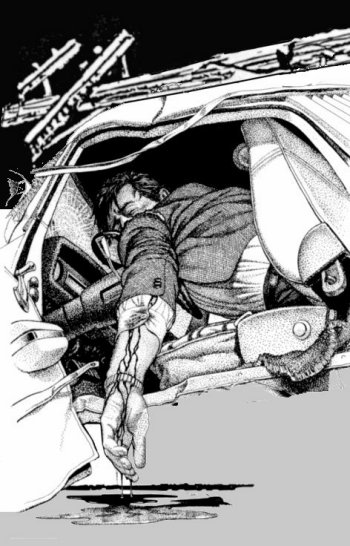 |
Everyone assumes that "Divine
Intervention" is something wonderful.
An angel whispers to Rick and his life is saved.
However, maybe there is a flip side to this coin.
Has
anyone ever considered Divine Intervention can also be used to
teach lessons in life? The Lord's Prayer asks
God to lead us away from temptation. However, based on
this cheating experience, I had a right to ask
if sometimes God deliberately leads us astray for
His own purpose. It seemed to me I had
just received proof that God
intervenes in the affairs of man whenever He chooses to.
In Hindsight, I can now say this bizarre incident
marked the birth of my belief in Fate.
For those who are Non-believers, I admit there were
valid psychological reasons to explain why I
cheated. So why pretend God planted the
suggestion in my mind? If the skeptics
prefer to dismiss this bizarre event as mere
coincidence, that is their privilege.
But one thing was clear.
I had been out
of my mind to take that risk.
What
did I stand to gain by cheating? I was
gambling 5 points on a meaningless test versus nine
years of stellar reputation as one of the smartest
boys in my class. Self-destructive behavior is
very difficult to understand.
What I had done
was so absurd,
I asked myself
over and over why would I lose my mind like that.
All
speculation aside, I am sorry to say I will never
know the true origin of my foolish decision.
As I feared, Bob did
turn me in. No surprise there. I deserved it.
Moreover I would have done the
same thing had the situation been reversed. But here's what
makes this story even stranger.
I was never punished. That in
itself is crazy. Caught red-handed, there could be no doubt
I was guilty. Well aware what I had done was wrong, I was
ready to accept
whatever punishment Mr. Salls saw fit
to deliver.
However, he chose to spare me. The following day Mr. Salls
sent Dunham Jewett, Head Prefect, to track me down in the hallway.
"Rick, there was an odd incident
yesterday that I
have been asked to
speak to you about. You were seen with an open book while taking a
German test. I know how good you are at
German. In fact, I consider you such a great
student that I cannot imagine someone
of your talent
needing to cheat. Don't
worry. You may consider the matter closed."
Dunham patted me lightly on my shoulder,
then walked away
without another word. Obviously he preferred not to discuss
the matter further.
It was over in 20 seconds. Paralyzed
by
shock, I fixated on the way Dunham
had stressed the word 'Imagine'. He made
it sound like it was inconceivable to think I had cheated.
That was a very curious conclusion considering
Bob had gotten a good look at my test
right next to an open book turned to the subject material.
My mouth fell open at the sheer
audacity of Dunham's
approach. He
did
not accuse
me of cheating. Nor did he ask me
if I had cheated, a question that would have put me on the
spot.
Instead Dunham had complimented me!
In his opinion, I was too smart to even bother considering the
thought. I scratched my head in confusion.
What in the world is going on here?
|
THURSDAY,
MARCH 14, 1968, Age
18, 12th Grade
SENIOR YEAR
CRISIS
the Jones scholarship outcome
|
Although I was relieved to
escape punishment, that did not mean the guilt went
away. My self-loathing was off the charts.
No matter what I did, no matter where I turned,
something always went wrong. At the moment, every important person
considered me a loser. I
quarreled constantly with my mother. I
argued with my
boss at the grocery store. My
father betrayed me. The worst was the
shame I felt regarding Mr. Salls. Over the
past three years, I had been one of the
hardest-working students in his German class.
I did this specifically because I wanted so much to
earn his respect. Now in an act of blinding
stupidity, I had lost that respect. Although
my Headmaster had been lenient, surely I had offended
him. Mr. Salls was known as a strict disciplinarian.
Well aware of other students who had been suspended
or expelled,
I did not understand why he had spared me. Nor
could I forgive myself. The thought that I had let
this esteemed man down was excruciating. I wanted
desperately to
knock on his office door, fall on my knees, and beg
for his understanding.
But I lacked
that kind of courage. Deciding I had burned my
bridges here at St. John's, my thoughts turned to college as
the only way I could think of to
restore my reputation. But considering I had
no clue how to afford a $20,000 price tag, my
college dream seemed hopeless.
Senior year had turned into
High School Hell. I was unable to play sports
due to my blind eye, forced to live in a madhouse,
forced to work after school because my father
was a jerk. The worst was my intense
loneliness. Fearful to approach a pretty
classmate due a face scarred by acne and bottom of
the barrel social status, in four years I had yet to
conduct a friendly conversation with a St. John's
girl. I felt so insecure whenever I compared
myself to these ultra-confident debutantes in the
making. Seriously, the only thing I had going
for me were my grades, but now I had tarnished those
as well. As a result, I was going downhill fast.
I was consumed with bitterness
towards my classmates for their carefree approach to
college. Everyone but me!
Throughout high school, the only thing that kept me going
was the thought of college. Why else would I
study so hard while my affluent classmates partied?
College was the only way I could escape this
terrible loneliness that enveloped me day in, day
out. College meant escape from my mother,
escape from Little Mexico, escape from feelings
of inferiority. Unless I could find some way to pay the
exorbitant tuition at Georgetown, I was out of luck.
I have one striking
memory from this time. I suffered from an extreme case
of tunnel vision. For some reason, I felt
like it was make it to Georgetown or die trying.
Although I had
every right to be disappointed, why was my desperation so intense? So
what if I couldn't pay for Georgetown? All I
had to do was sit out a year and reapply to the
University of Texas for the following school year.
I could easily pay for UT out of my own pocket.
And if I waited, I could save more money working
full-time at the grocery store for another year. However, the thought of waiting
out a year
was unbearable. Determined to escape
Little Mexico, I was psychologically incapable
of seeing any sort of alternative. I deserved a scholarship, of
that I was convinced. But how was I supposed
to obtain one? My friend David had me convinced that Georgetown would not dream of giving me a
scholarship unless my parents cooperated by
filling out financial aid forms. Even in the
remote case
my
father decided to cooperate, his hefty salary was a serious deal-breaker to
any claim I made of destitution. And given the
bitterness I felt towards my mother, I did not want
her help. Why would some anonymous financial
aid person at Georgetown take the word of a teenager
regarding his bizarre situation?
"Young man, why are you
contacting me instead of your parents?"
"Um, Mr. Georgetown, sir,
I am totally on my own. My mother disinherited
me because I don't speak Spanish. As for my
father, my stepmother made him forget about me long
ago."
"Why won't your parents
agree to help?"
"My mother is broke, so why
bother to ask? My father makes more than
enough money to
send two children by a second marriage to private school.
However, he claims he has no money left to help me.
My father is a lost cause."
"I'm sorry, young man,
but how am I supposed to know you are telling
the truth? Money doesn't grow on trees. If you wish to be considered
for scholarship, tell your parents to fill out
the forms like everyone else."
Ask my parents for help?
What parents? I occupied a bizarre life space.
I occupied a room in my mother's
flophouse, but otherwise operated totally independent of her
authority. My father checked out the moment he
handed me the $400. In Hindsight, the only adult I
could have turned to was Mr. Salls. I imagine
he could have told me what to do.
For that matter, he might have been willing to
contact Georgetown himself. However, now that I had burned my bridges with the cheating incident,
I did not dare go anywhere near Mr. Salls. Bottom
Line, I was totally on my own. Which was a
real problem because I was out of control. Nevertheless, I had to try.
|
 |
Desperate to find a way to pay
for Georgetown, I cooked up a
grand scheme called "Foot in the Door". Here is how the plan worked.
I had been accepted at Georgetown.
Age 18, I
assumed I could enroll without my mother's
permission. There was no way on earth I could
pay for an entire school year by myself.
However, after careful calculation, I believed
I had just
enough money to pay for one
semester. Tuition plus room and board was $6,000 a year.
That was way beyond my reach. But one day it
occurred to me that colleges allowed you to pay one
semester at a time. If so, I had
$2,000
in grocery savings, my father's $400, plus $1,000 per
year Jones Scholarship. Even if the Jones
Scholarship was broken in half ($500 per semester),
I was close enough to enroll for one semester at
Georgetown in the
Fall of 1968.
Once I got my
Foot in the Door,
at some point I would make an appointment to speak
to a Georgetown financial aid officer and beg for a
scholarship. If the man said no, at least I
tried.
But I did not
believe that would happen. My good
grades plus a heartfelt face-to-face would surely convince
someone to help. Even better, after winning
the Jones Scholarship, I could use that
accomplishment as evidence of both my worthiness and
my need.
Since I saw this
plan as my only way to
escape my home situation, it was worth the gamble.
If worse came to worst, I would drop out after one
semester and ask Uncle Dick for a job at his computer
company in Northern Virginia. In the meantime I would apply to
UT for the following school year. Anything was
better than sticking around at Little Mexico.
Looking back, this was
actually a fairly good plan.
However, first I
had to win the Jones Scholarship. Not a
problem. I was a shoo-in. Or so I
assumed.
Unfortunately I was plagued
with
the same premonition of doom that had haunted me
prior to my father's $400 rebuke. As the clock
ticked down, the fact
that no one at my school had said a word to me felt
like a very bad omen.
|
Sure enough, I was
right. On a Thursday morning in mid-March,
my Foot in the Door plan went up in smoke. I
gasped as the Houston Post announced Katina Ballantyne had won the St.
John's award for the class of 1968.
Stunned, this terrible news felt like a knife
through the heart.
There goes my last
chance to go to Georgetown.
Considering I already thought the world was
against me, my sense of injustice was off
the charts at this latest reversal. Considering Katina came
from a wealthy family, this made no sense.
What on earth went wrong? Grasping for any kind of reason to explain
why I had lost, I turned white when a
horrible thought came to mind. What if Mr. Salls had done this to punish me
for the cheating episode? Why
bother with a nasty cheating scandal?
Bad for the school's reputation.
Easier to punish the cheater by denying him
a scholarship that was rightfully his and put Katina's pretty face on the
next SJS Alumni magazine.
Oh my God, what
have I done to myself? My last
chance to pay for Georgetown next year was
gone
and it was my own fault. All that work
down the drain. Consumed with
self-hatred, I fell to pieces. Little
Mexico, my father, my mother, the cheating
mistake, plus the stupidity of not applying
to a college I could afford. As if
this was not bad enough, I had kicked away a shoo-in scholarship. It was all too much to
bear. I spiraled into the worst
depression of my life as thoughts of suicide
drifted in and out of
my mind.
In Hindsight, what
scares me is how utterly mixed up I was.
People wonder at the high rate of suicide in
high school and college. I hate to say
it, but it makes perfect sense to me.
Young people lack perspective, especially
those like me with no one to turn to.
They don't seem to realize bad fortune often
turns around if one can be patient and keep
working through hard times. I was a
tall, strapping boy who possessed
self-discipline and a powerful work ethic.
I was about to graduate near the top of my
class at the toughest school in
Houston. Given these blessings, it did
not make a
bit of sense that I was thinking of ending
my life. Indeed, I had a bright future
ahead if I could just weather the storm.
Instead I was
my own worst enemy. Filled with
hate towards myself, I could barely
withstand the pressure of guilt and constant
self-criticism. Indeed, my mood was
precarious. Teetering on the edge of a
nervous breakdown, I was badly out of
control. One more mistake on my part and it was
time to locate the nearest bridge.
|
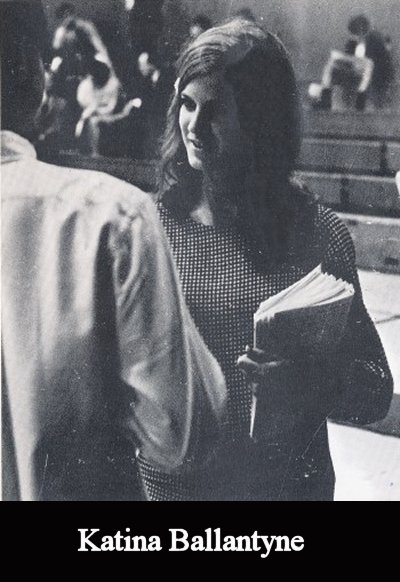 |
Exhausted and barely
able to function, over the following week I
somehow forced myself to carry on.
Every day was a blur. I spoke to no
one unless I had to. Oddly enough, the
one thing that kept me going was my outrage
towards Maria Ballantyne, Katina's mother.
I was beyond livid. Losing the Jones Scholarship was not
Katina's fault. Nor was it Mr. Salls'
fault. I had
brought this on myself. But I was
also certain Mrs. Ballantyne's considerable
influence had something to do with her
daughter's good fortune.
I had studied Mrs.
Ballantyne like a hawk for nine years.
Not a week went by when I did not see Mrs.
Ballantyne speak with Mr. Salls in the
Commons Room or walk with him side by side in the hallway. It was obvious the two
of them were buddies. Which made
perfect sense. It wasn't just the
immense tuition she paid to send seven
children to SJS. Credit Maria
Ballantyne for raising seven of the finest
students in the school. If Mr. Salls
was going to do someone a favor, who better
than Mrs. Ballantyne? The rich get
richer while the poor kid gets
the shaft.
|
WEDNESDAY,
MARCH 20, 1968, Age
18, 12th Grade
SENIOR YEAR
CRISIS
THE PARKING
LOT CONVERSATION
|
 |
It was Wednesday,
March 20. Six days had passed since
the newspaper announced Katina's triumph.
I was a beaten kid. All fight was
gone. There was nothing left I could
do to rescue my dream of college for this
coming fall, no more Foot in the Door
fantasies. Meanwhile the thought of spending another
year at Little Mexico was unbearable.
I suppose I could move out, but how would
that help me save money on a grocery store
salary?
My father's
disdain was bad enough, but the thought of
letting Mr. Salls down was even worse.
Mr. Salls knew me better than my
own father. Unlike my father, Mr.
Salls was in a position to judge my
character. The verdict was in and he
had found I lacked integrity. By denying me that scholarship, my
status as a loser had just been affirmed by
the most important man in the school.
As I drove to my
grocery job that afternoon, the combined shame
of being caught cheating plus kicking away a
sure-thing scholarship was intolerable.
I was enveloped in depression tighter than a
straight-jacket. How I made it through
each day of school I will never know. Unable to concentrate, I could not find a
way to get my conscience to ease up.
Terrified by random thoughts of suicide, not
a moment passed without mind-numbing
criticism on how I had made a mess of
my life. Gee whiz, I had worked like a
dog at the grocery store for three
years to save money. I had endured
constant loneliness to study long hours in hopes
of a scholarship. Given all the
sacrifices I had made in search of my dream,
why would I jeopardize all that hard work by
cheating? It staggered me to realize in one
bizarre moment I had thrown it all away in an act of colossal bad judgment.
Another
year stuck at Little Mexico was
exactly what I deserved for being an idiot.
It was my
own fault for being so stupid! Speaking of Little Mexico, maybe it was time
to forget about German and learn something
useful for a change. How about a
Spanish course at the local community
college? Then I could stick up for
Terry next time that little brat kicked
my dog.
|
Moments after
starting my afternoon shift at the grocery store, I
stopped cold in my tracks. None other than
Maria Ballantyne had just walked in out of the blue. I was
incredulous. In three years, I had never
seen her in here. Given that she
been prominent in my thoughts over the
Jones Scholarship disappointment, her
sudden and quite
unexpected appearance was beyond weird.
For a
moment I thought she had come to see
me. But when she walked right past me
with no sign of recognition, I realized
my mistake. With seven mouths to
feed, more likely Mrs. Ballantyne had
noticed my store on her way home.
Although my
store was nowhere near her house, I
suppose it was as good as any in a pinch.
There was no way
Mrs. Ballantyne could have known
she was my secret nominee for best mother in
the school.
She did not know me from Adam.
We had never spoken; not once in nine years had I caught her eye.
I desperately wanted her
to explain how a rich girl like Katina had
won the scholarship.
However, I was far too introverted to
confront her. I did
not even have the guts to
introduce myself. The best I could do
was sack her groceries and
offer to take her
two grocery carts outside.
|
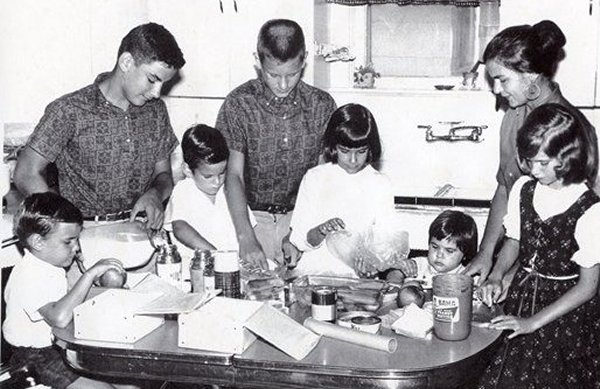 |
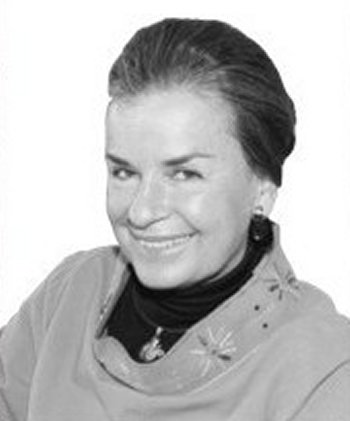 |
As we walked to
her car, I had mixed feelings. Chalking up the
achievements of her talented children to her
skill as a parent, I had long admired Mrs.
Ballantyne. If you had
asked me the week BEFORE she helped Katina steal my
scholarship, I would have been
full of praise. If you had asked me
the week AFTER, I hated her guts.
However I had changed my mind in the last
couple days. I decided Mrs. Ballantyne had every
right to help Katina.
Even the fact that she had probably persuaded
Mrs. Salls to give the scholarship to her
daughter did not change my opinion. In
fact, it had the odd effect of improving my
respect. That is what a good mother
is supposed to do, look out for her
children. I just wished I had a mother
capable of similar feats.
My visit to her car
was uneventful.
Mrs.
Ballantyne
stared into space as I put the groceries in
her trunk. When I finished, she
wordlessly handed me two quarters,
smiled briefly, then turned to go.
I grabbed the grocery carts and glumly headed back to
the store.
Just
then I heard her voice behind me. "Young man,
could I speak to you for a moment?"
When I turned
around
to look, she said,
"Do you
by some chance go to St. John's?"
As it
turned out, Mrs. Ballantyne had noticed I
appeared to be wearing the St. John's
uniform. Although she did not
consciously recognize me, something told her she
knew me from somewhere. When I answered
yes, that
broke the ice. Now Mrs. Ballantyne was
curious. By definition, St. John's
students were highly
privileged. So why was this boy working a menial $1.25 an
hour job? After I answered a series of
probing questions, she reached
several conclusions. One, I was poor.
Two, I was deeply disturbed. Three, I reminded her of her own difficult
childhood. Yes, believe or not, I was
about to discover this high and mighty woman
had experienced a difficult childhood
remarkably similar to my own.
|
To my
astonishment, Mrs.
Ballantyne proceeded to
tell me the story of how she had faced great
hardship as a young girl.
"This might come as a surprise
to you, but things were very tough for me back when I was
growing up. Like you, I had a similar experience of growing up around
wealth even though my own family was not particularly well off."
As I listened to her tale, I was haunted by
an air of unreality. I had no idea why
the most prestigious woman I
knew would take interest in a nobody kid like myself, a
stranger no less. Why would she tell her life story to a complete stranger? Why should she
care?
"Empathy" is the
ability to sense other people's emotions, coupled with
the ability to imagine what they might be thinking or
feeling. In Hindsight, I believe Mrs.
Ballantyne was startled to discover a young
man from St. John's whose childhood was just
as difficult as her own had been. Given where
she and I started in life, realistically neither of us belonged
at St. John's. The odds that
either one of us would end up at St. John's was a
long-shot at best. But for both of us to be at St. John's? Don't be
ridiculous. Only in a coincidence-filled Charles
Dickens novel do crazy things like this happen. Although I had no clue why she
had opened up to me, I thanked my
lucky stars that she had taken an interest. Based on
her past,
she was
the best person at my school capable of
understanding what I was going through.
In addition, her
skill as a parent allowed her to realize
that I was in serious trouble. Sympathetic to my
plight, I believe Mrs.
Ballantyne could sense the jeopardy I was in. This explains why
she made a snap decision
to befriend me.
As I listened wide-eyed to the sad story of
her childhood, I
pinched myself repeatedly. The utter improbability of our
chance meeting was very unsettling. If we had met
on premises at St. John's, our random encounter would
have made sense. However, despite
passing each other in the SJS hallways a thousand
times over nine years, we had failed to
connect a single time. Furthermore, the
near-impossible way I had been caught cheating
predisposed me to interpret what was happening now
as pure Twilight Zone. Given my superstitious
streak, the fact that this meeting was taking place in such an unlikely
location bothered me greatly. Mrs.
Ballantyne had no business being here. My store was
located in a middle class neighborhood at
least three miles from her home in posh
River Oaks. With three grocery
stores within walking distance of her home, why stop
here? Why not keep driving and stop at her usual
store? Equally strange
was our mutual presence at St. John's. I already
knew my participation at St. John's was a total fluke.
However I never expected the
most important woman at my school would
admit to a complete stranger that her presence at SJS was
also a fluke. What strange quirk of Fate had
placed us at St. John's? And what quirk of Fate had brought us together in
this parking lot at such a critical time in my
life? Nothing about this
conversation made a bit of sense. Unable to answer
these questions to my satisfaction, I
listened with a sense of awe.
Mrs. Ballantyne
had
grown up in nearby Galveston, Texas. Her mother was wonderful,
but the lady had tragically died of a sudden stroke when
Maria was 11.
Her father went off the deep end.
Breaking his leg
in a car accident shortly after his wife's death, he was
unwilling to care for his four children. He told his
two older sons to go find jobs in Houston.
He
farmed his son George, 13, to his brother on the other
side of Galveston island. He bullied his
sister-in-law to take Maria. Then he disappeared
from sight to feel sorry for himself and do some
drinking while his leg
healed. When Maria's father finally
resurfaced, he was too busy gambling and chasing
women to come see his young daughter.
Maria was stunned
by his abandonment. In a matter of months, she had
lost her mother, her father, her older brothers and
George, her only friend. Maria's Aunt
Virginia
had problems of her own.
Fighting to keep her restaurant afloat during the
Depression,
the woman was overwhelmed. She
had two children and was pregnant with another.
As a result, Maria was ignored.
Well aware she was unwanted where she lived and separated from George,
her only source of support, the
ensuing year was the toughest of Maria's life.
Feeling like an orphan, she suffered from abandonment, intense loneliness,
plus a sense of being forced
to raise herself
[sound familiar?]
Shocked by the
similarity of her story to my own, I could not help but
wonder how Mrs. Ballantyne had escaped poverty to be
transported to the
idyllic Xanadu of her future life.
I understood the rags, but how did she attain the riches?
Almost as if she could read my mind, Mrs. Ballantyne shared a deep secret.
Without being asked, Mrs. Ballantyne whispered that a Galveston
mobster had unexpectedly offered to pay her
way to college. She add that this ticket out of the
poverty trap was the luckiest break of her life. I hoped
she would tell me more, but that is where she ended her
tale. Now she looked me square in the
eye to get my attention.
"Rick, as you have
surely guessed, I have told you my story for a reason. Your
unusual background reminds me very much of
my own childhood. I had it tough. If it
weren't for all sorts of lucky breaks, I might be waiting tables in a Greek restaurant or taking dictation
today. You sack groceries?
Well, guess what. When I was a kid, I was no stranger to washing
dishes. But I made it out of there. If I can overcome adversity, you can too. In
fact, it looks to me like you are well on your way. I have been around St. John's a long time and I have
never heard of a student working a full-time job after
school. Never. St. John's students have every privilege
imaginable, so I never expected to find a young man like you
earning money for college. You are definitely one of a
kind. Things are tough for you now, but I strongly
encourage you to hang in
there. You have too much going for you to stop now."
|
WEDNESDAY,
MARCH 20, 1968, Age
18, 12th Grade
SENIOR YEAR
CRISIS
THE
forbidden subject
|
I nodded when Mrs.
Ballantyne finished. What she said made sense. I did
not want her to go. Just the fact that she was giving me
so much attention had bolstered my spirits considerably. I
expected her to leave at this point, but to my surprise she
lingered. I wanted to say something in response to her
story, but
suddenly found myself tongue-tied.
Holding back a waterfall of tears, I
was having fits keeping my composure.
Although her
encouragement was appreciated, it had unleashed a wave of painful emotions
regarding the loss of the Jones Scholarship and my dream of
Georgetown. All this frustration I had been trying to hold back was
demanding release. As if that was not enough to cope with, my brain was going crazy
trying to process my growing sense of Unreality.
Coming so close on the heels of Bob Franklin catching me
cheating under extraordinary circumstances, this highly unlikely
parking lot conversation felt very eerie. Something weird
was going on, I was sure of it. However, as the pain
grew intense, it drowned out the wild ideas
of Divine Intervention racing through my mind. I was just about to burst
into embarrassing gut-wrenching sobs when the strangest thing happened.
"Rick,
did you
know that my daughter Katina recently won the Jesse Jones
Scholarship?"
At the
mere mention of the Jones Scholarship, a lightning bolt of shock
flashed through me. Did Mrs. Ballantyne really say
that?!?
The jolt was so intense my flood of
self-pity vanished on the spot. It was replaced by burning anger
as my
eyes grew wide with disbelief.
It was like she
could read my mind. Did Mrs. Ballantyne know this was the incident
that
had triggered my crisis? Unlikely. But even if
she did guess, where did she get the nerve to
broach the Forbidden Subject?
As I bristled with rage,
I could not believe
Mrs. Ballantyne
had the guts to bring this
sensitive issue
out in the open.
Good grief, I was an unstable
teenager with a razor's-edge temper. I towered over the lady by ten inches and
outweighed her by a hundred
pounds. Nevertheless, despite my size and hair-trigger
emotions, Mrs. Ballantyne never blinked. Stunned by her
boldness,
I don't know what came over me, but just as quickly as my rage had
appeared, it
disappeared. My anger was replaced by the strangest
feeling that this conversation could not be happening!!
Convinced this had to be a dream,
immediately the eerie Twilight Zone music began playing in my mind. If this
is
a dream, when do I start flying?
|
Mrs. Ballantyne had
just escalated the overall improbability of this unexpected conversation
into some sort of parallel universe. Where did she
find the audacity to speak so openly? My mother and
father had never talked directly about problems in this manner.
No one... repeat no one... in my world had the guts to
openly discuss a subject as controversial as this. No one, that is,
except Mrs. Ballantyne. She was apparently fearless.
Even if it was true she had manipulated Mr. Salls in some way to obtain that scholarship for
her daughter, I didn't care anymore.
Truth be told, I was too
stunned by the 'Totality' of this woman to be angry anymore.
I had never met anyone like
Mrs. Ballantyne in my life.
Seriously, I did not know what to
make of her. This conversation had become weirder than
UFOs, reincarnation and alien abduction combined. Shocked that Mrs.
Ballantyne had brought up the Forbidden Subject at the exact moment I
had been thinking about it, I stared at her with a mixture
of confusion and awe. Was Mrs. Ballantyne from
another planet?? She
reminded me of an alien who comes to earth to tell everyone to calm
down and stop bickering.
Convinced this
perceptive lady had
powers I had no explanation for,
I gave up trying to figure out what
was going on.
Instead I simply
surrendered and began looking around for a white flag to wave.
Mrs. Ballantyne was by far the most impressive human being I had
ever met. Or maybe she was immortal. I had the exact
same feeling one might have if Zeus or Hera strolled down from
Olympus for a pleasant afternoon chat.
|
 |
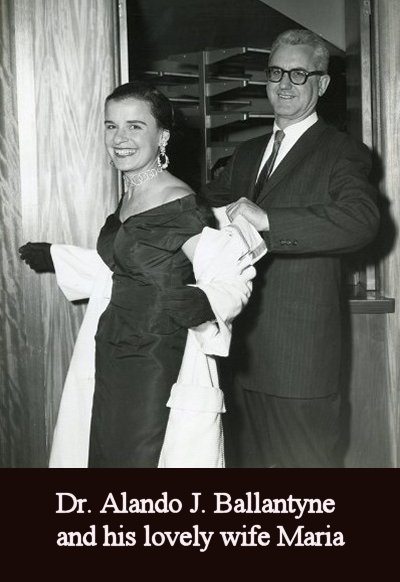 |
Noting
I was too astonished to respond, Mrs. Ballantyne took the reins.
She launched into
a detailed explanation of how Katina won the
scholarship.
"Rick, people at St.
John's are completely fooled by my family. My children and
I laugh about it all the time. So many people think we are
rich that it has become kind of a joke to us. Big
house, fancy neighborhood, huge oak trees, seven children at an
expensive
school. They assume my husband Jay must be rich as King
Midas. Nothing could be further from the truth. Jay
makes a good income, but his pay is fixed because he works
for the University of Texas.
Jay
treats cancer at MD
Anderson and some research as well.
His
salary is much lower than surgeons in
private practice. I suppose he could
ask for more, but he had refuses to engage
in self promotion. Unwilling to
renegotiate his salary, his income is nowhere near as lucrative as people think. In many ways, this
situation works against him because it caps his
earnings considerably. Opposed to the kind of money
physicians can make in private practice, Jay has no obvious way
to expand his cash flow. However, he loves his job so much
he would not dream of leaving.
Despite my
family's
seeming affluence
and nice home, my husband's salary can only stretch so far.
In other words, there are degrees of rich. The
Ballantyne finances are strictly budgeted. Money is very
tight at home. If it wasn't for my brother George, I don't
how we would make ends meet."
Seeing me stare with incredulity, Mrs. Ballantyne laughed in amusement,
then continued.
"I have seen that
look before and I know what you are thinking. But I'm serious.
You may not believe
this, but even my children think we
are kind of poor. When my
oldest son Michael first went to St. John's, he came home
convinced he was the poorest kid at school. He and I
argued all the time, but
Michael
kept saying right up
till the day he graduated that he was the poorest kid at St. John's.
All his brothers and sisters took his side.
Clearly we are not poor. However,
since everything is
relative, it is true we are out of our league
compared to the wealth of other families at St. John's."
|
Although I was still too
flustered to speak, my mind worked. This was the
most fascinating information I had ever heard. It
also made sense. I
had never considered that even rich people
have to struggle to make ends
meet. Seeing the incredulous look on my
face, Mrs. Ballantyne decided
to drop a bombshell.
"People see our
beautiful house in River Oaks and jump to conclusions.
They have no idea this house was a "welcome-back-to Houston" gift
from my brothers George and Johnny when Jay got his job.
Furthermore, this might come as
a surprise, but every child in my family is receiving financial
aid. Did you know Katina is on scholarship at St. John's just like
you?"
What?!? Katina
is on scholarship?
I
was dumbfounded.
"Someday when you
become a father and raise children, you will begin to understand
that is very expensive to give a child a good education.
But you will also remember your St. John's education and realize
that giving a good education to your child is the most important gift of all besides
love."
|
 |
Mrs. Ballantyne paused to let
her words sink in, then continued.
"Yes, my husband is a very successful doctor
with an international reputation, but if
people only knew! Based on my husband's
fixed
salary,
it would be impossible to
simultaneously send
SEVEN children to an expensive
private school like St. John's without
financial help. Every
one of my children has a partial scholarship."
I could not help but think of
my father. When we had met for lunch
back in December, he had complained how hard it
was to pay full price to send my half-sister and half-brother to private school.
Given that my father lived in a very expensive
neighborhood, I had assumed he was sandbagging with
plenty of money to spare. Now I realized he
was probably caught in the same money crunch as the
Ballantyne family. Still, that
was no excuse for breaking his promise
to pay for my college education.
He had six years to save money and the best he do
was $400? Pathetic. I immediately felt
my blood boiling again. No
doubt my father was thrilled to get rid of me. Now he
could get the former mistress off his back.
I could read his mind. "I
am so glad I don't have to pay child support
anymore. Let's give the kid a few hundred bucks for
college and maybe my wife will finally shut up."
I was about to let my
bitterness take over again, but just then
Mrs. Ballantyne resumed her
explanation.
"College is far more
expensive than St. John's. My son Michael is
already in college at Stanford. You have no idea how
expensive Stanford is. Thank goodness Michael is
brilliant. Yes, he is on scholarship. So is Dana
at Vanderbilt.
Now Katina is ready for college as well. After that it
will be Marina, then Christie, then George, then Lisa. I lose
sleep wondering how we will afford their education. Paying
for college
can be very complicated!"
Mrs.
Ballantyne was so animated, I could tell she
had considerable energy on the subject of college finance. If I did not know
better, the subject of financial aid was just as stressful for her
as it was for me. She was getting a burden off her chest at the same time
she was enlightening me.
It had
to be exorbitant to give seven children a quality education at the
same time.
"What do you mean by 'complicated',
Mrs. Ballantyne?"
"Katina
will need help with her tuition next year at Vanderbilt in much the
same way you will need help going to Georgetown. The problem is that
college administrators look at our affluent River Oaks zip code and my
husband's prestigious position at MD Anderson and jump to the same
conclusion as everyone else... 'The Ballantynes must be rich!'"
"I have
always assumed you were rich, so it is likely the
people at Katina's college will do as well."
"You
are right, but that makes me
so mad! If I hear one more college administrator throw how rich we
are in my face again, I will scream.
I argue with them all the time. For some reason, all these
men can do is see one child at a time, the one who is applying
to their school. They tell me my husband makes far too
much money to justify a scholarship for Katina. Why can't
they see how hard is to pay for seven children
at once? Believe it or
not, Jay's salary will make it impossible for Katina to get a
full scholarship. Thank goodness she won the Jones
Scholarship. It is a huge blessing. I have never
felt so relieved in my life."
My friend
David had been right... a parent's salary affects a
student's scholarship status. That meant
Katina was in a similar fix as me. Her
father's paycheck undermined her chances of getting
a scholarship. Thank goodness Mrs. Ballantyne
had cleared this up. I would have never
guessed the truth in a thousand years.
The one thing Mrs.
Ballantyne did not explain was her personal role in Katina's award,
but it did not matter. Although I remained convinced that her
political clout had something to do
with Katina winning that scholarship, my sense of fairness
was restored. As
long as Katina also needed the money, I could not think of a more worthy
candidate.
At this
point, my thoughts shifted from Katina to Mrs.
Ballantyne. It was amazing to
see how skillfully this lady dealt with the
sensitive topic of why Katina won the scholarship
instead of me. Her candor stood in stark contrast to my father who
refused to deal with the same subject openly.
With three children and barely enough money to pay for two
private
schools, Dad made me odd man out. He handed me $400
and pretended he had kept his word. Did he bother to
explain why he had short-changed me? No. He avoided the
subject. Truth be told, I would not have been in this
crisis if he had explained his financial
difficulties openly.
Instead he blind-sided me with the $400 betrayal AFTER it
was too late to apply for a less expensive school
like UT.
His cowardice paled in
comparison to Mrs. Ballantyne. Ignoring the
chance that I might lose my temper, she raised the
subject of financial aid specifically because
her intuition guessed I was desperate
for an explanation. For the millionth time, I could not help
but note how fortunate Katina was to have a mother
like her.
My burden was gone.
All this time I was under the impression that rich and greedy Mrs.
Ballantyne wanted Katina to have the prestige. Nothing could
have been further from the truth. Feeling sheepish, I didn't care anymore
that I had lost the scholarship. As my mind adjusted to the
new facts,
I accepted that Katina was equally deserving.
If someone
else had to win, I was glad it was Katina. I
had always liked her. Katina was the kind of
person you could build a world around... decent,
responsible, talented. Just like her mother.
For the first time in ages, I began to smile.
Not only that, I
had magically regained my
confidence.
My eyes were completely dry and I stood up straight.
I was relieved to find my ability to speak had
returned as well.
"You know what, Mrs.
Ballantyne, I am glad Katina won that scholarship. I wish I
had won it, but it's okay. I really appreciate that you took
the time to help me understand."
I smiled
as I said this. And I meant it too. I
spoke from my heart. Now that Mrs. Ballantyne had healed me
with her soft touch, I was okay. I wasn't mad any more.
The world wasn't such a bad place after all. Forget the
drama,
it was time to move on. Even if Spanish class at a community
college was
my next step, so what. I had my whole life ahead of me. One little
detour would not keep me down.
Mrs. Ballantyne was positively beaming. The sincerity of my
words about Katina meant a lot to her, I was sure of it.
Bless her heart, she gave me the oddest smile. Perhaps Mrs.
Ballantyne had felt a little guilty. Until she met me, she had no idea
there was some other kid at St. John's who was just as desperate to win that award
as Katina. I imagine she sensed how difficult it must
have been for me to lose that scholarship, especially since I had
never received any sort of explanation for being
bypassed. Mrs. Ballantyne was
special. I felt so lucky to meet her, I could
scarcely believe this had happened.
"Rick, I know you
must be frantic about money for college, but I wouldn't worry
too much. With your grades, I imagine whichever school you
choose will seriously consider you for a scholarship. I
think you have a great chance."
My eyes grew wide. Did she know something?
Feeling my pulse race, I asked, "What do you mean, Mrs. Ballantyne?"
Mrs. Ballantyne was more
than happy to elaborate.
"After
taking care of
Michael, Dana and Katina,
I know quite a bit about
how college scholarship money
works. In my experience, the combination
of great grades and great need will guarantee
you scholarship
money at any well-endowed school in America. In addition,
your St. John's pedigree is a powerful asset.
Any college would want a student like you. I imagine
college loans and work-study jobs will bridge any further gap.
I say relax.
You need not worry. I
would bet the farm that
whatever school you apply to will take care of you. Stop
worrying about money. It will take care of itself."
I stared at her with my
mouth hanging open.
I wasn't convinced. Mrs. Ballantyne probably didn't know
my father's salary would be a serious handicap to
getting a scholarship. Nor did she know about the cheating
incident. I felt encouraged nonetheless.
Maybe she knew something she was not at liberty to share. Had
Mr. Salls told her something? One could only hope.
However I dismissed the thought as wishful thinking. Mr. Salls
hated me (or so I thought at the time). More
likely she was just trying to cheer me up. Now that Mrs. Ballantyne
had finished explaining how college scholarships were handled, her
work was done. She took my right hand in her hands and squeezed
it affectionately. We shared a big smile, then it was time to go. To be polite, I opened the car door for her.
Mrs.
Ballantyne rolled down the window. "Don't worry about the
money.
I promise things
will work out for you."
She waved goodbye and off she
went. I was unable to move after she left.
I just stood there in the parking lot trying to
make sense of it all. Our conversation had lasted 45 minutes.
Amazingly, no one from the grocery store had come looking for me.
That in itself was kind of odd.
I was incredulous at
what Mrs. Ballantyne's pep talk had accomplished.
The weight of the
world had been lifted from my shoulders. The
grudge over the Jones Scholarship
was gone. The bitter envy towards my
privileged classmates had dissipated. I was amazed to discover my vast cesspool of self-hate
had magically drained. Even my fears about
college tuition were gone. So I would have to
sit out a year. Big deal. I could
scarcely
believe how relieved I felt. I had a sense of
optimism for the first time in ages. In the process,
my darkness had been replaced
by
pure admiration for my hero. Now for the first
time I understood why I had watched her all these years.
I had been drawn to Mrs. Ballantyne because instinct told me she was a remarkable woman. I thanked my lucky
stars for the good fortune to meet this dynamic lady today. She had accomplished
a miracle.
|
WEDNESDAY,
APRIL 10, 1968, Age
18, 12th Grade
SENIOR YEAR
CRISIS
QUITE A SURPRISE
|
I no longer worried
about college in the days that followed
my meeting with Mrs. Ballantyne.
Relieved of my anger towards the world, the
thought of
living at Little Mexico for another year no longer bothered
me. I guess I was used to it by now.
I figured I would spend next year
sacking groceries, learn some Spanish,
reapply to the University
of Texas,
maybe
even ask some of the girls I met at
the grocery store for a date. Best of all, I
would not have to say goodbye to Terry when
I left for college, a move I had been
dreading. The chance to spend another
year with my beloved dog was special.
Three weeks after the Parking Lot
Conversation, I received a message that Mr.
Salls wanted to see me in his office
immediately. Oh no, what was this
about? Not the cheating scandal,
please. I checked out of Study
Hall to see what he wanted.
|
As I entered Mr.
Salls' office, I was very tense. During the 9th, 10th,
and 11th grades, he had been a daily fixture as my German
teacher. However, he disappeared after assuming the role of
Headmaster.
This visit marked only the second time I had spoken to him
all year. Seeing no
one else in his office, I
breathed a sigh of relief. No disciplinary firing
squad was present to deal with the cheating episode.
However, Mr. Salls
was very formal. No
eye contact, no smile, no cordial greeting in German today. In
fact, he
didn't even bother to look up. Continuing to read something on his desk, he
whispered,
"Mr. Archer,
please sit down. I will be with you in a moment."
What was this about? There was no way I was able to
relax, so I sat poised at the edge of my chair. There were
so many questions I wanted to ask, but most of all
I fought the wild urge to fall to my knees and beg forgiveness. I wanted to apologize for the cheating incident
in the worst way. Plagued by guilt,
I still felt terrible for
losing this man's respect.
Unfortunately, never in a million
years did I have the guts to bring up the painful cheating subject on my own. Mrs. Ballantyne might have the courage
to discuss Forbidden Subjects, but not me. The shame was too great. To begin with, I would die if Mr. Salls asked me to
tell him the truth. In fact, that's probably what this
was all about. But then I dismissed the thought.
If Mr. Salls wanted the answer, he would have asked six weeks
ago. Worried sick,
I sat there
in silence awaiting my unknown fate.
|
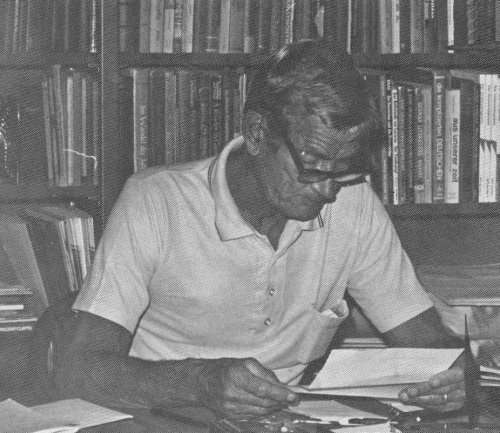 |
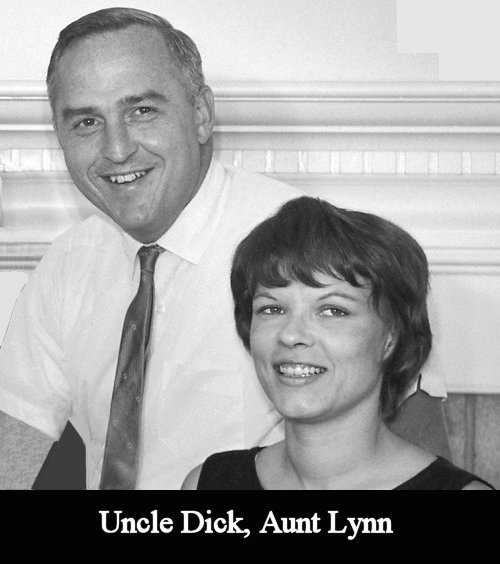 |
Finally Mr. Salls finished whatever he was doing
and looked up. Mr. Salls had his stern mask on today. No
smile, no
pleasantries. He was all business, curt and frowning. No 'how are you?',
no warmth, just his dark, inscrutable face
and penetrating eyes. Given how brusque his manner was, I
believed Mr. Salls was still angry at me
for cheating.
With a sinking heart, I guess I would be angry too if I
was in his
place.
Mr. Salls said, "I understand you have been accepted
at Johns Hopkins University. Is this correct?"
Without changing
expression, I smiled to myself. Aha! So this was not about the
cheating incident after
all. What a
relief. It also crossed my mind that this was an odd way to begin
a
conversation. I assumed that news of my Hopkins acceptance as
well as Georgetown came to him automatically,
but maybe not.
I suddenly became very curious.
"Yes, sir. I have been accepted at Johns Hopkins."
Mr. Salls continued.
"Very
good. Are you still interested in this school?
Because if you are, I would give this school my highest recommendation.
Hopkins is a fine institution."
I groaned. Still
interested? Give me a break. I was
never interested!
However, I was careful not to say that out loud. There was no point in being rude,
but I am sure it was written on my face. My
heart was set on Georgetown University. This school was situated a stone's throw
across the Potomac River from Aunt Lynn and Uncle Dick.
They were
the closest thing to a real mother
and father I had ever known. The chance to be close to them meant
everything. I wanted to be part of their family.
|
Just then I snapped out
of my bitterness over missing out on Georgetown. I looked up and realized Mr. Salls had been
staring at me for at
least half
a minute waiting for a reply. Embarrassed, I realized I had been
lost in space. Hmm. Mr. Salls had just inquired if I was
interested in Hopkins. What should I say? Should I tell
him the truth? No, bad idea. Even though I had never
been remotely interested in Johns Hopkins,
I was very interested in what this meeting was about. I decided to
tell a little fib.
"Mr. Salls, I don't
know much about Johns Hopkins, but from what you told me last fall, yes, sir, I am
very interested."
Fib? A much
stronger word was called for. In reality I had just uttered
the worst bald-faced lie of my life. I resisted the urge to
touch my nose to see if it had grown any longer. I suppose Mr.
Salls caught the insincerity in my voice because now it was his turn
to grow silent. When Mr. Salls began to stare at me intently,
I stopped breathing. It felt like he was conducting some sort
of mind probe to discern the truth. Uh oh, what if Mr.
Salls was just as psychic as Mrs. Ballantyne? What if he
sensed what a phony I was? The suspense was brutal.
30 seconds? A minute? Maybe he was thinking about
bringing up that cheating
incident. Feeling a sudden surge of anxiety, I prayed he would
not talk about that. Finally Mr. Salls gave a shrug of sorts.
I assumed he had made up his mind.
"Very well. In that case, I want you to do me a favor. I want you
to call an old friend of mine, Ralph O'Connor. Mr. O'Connor is the
Houston-area representative for Johns Hopkins University. I would like for
you to meet with him and learn more about his school."
Mr. Salls handed me a
card with Mr. O'Connor's business number on it, then glanced at the
door. I got the message, time to go. I departed swiftly.
|
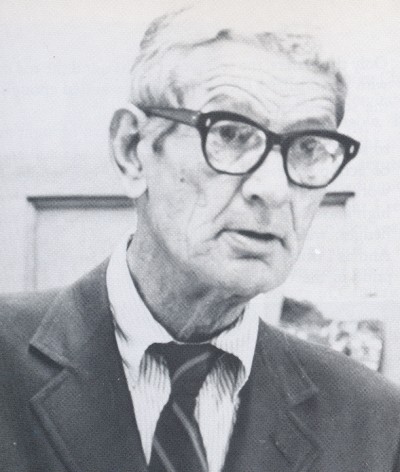 |
As I headed for the
school receptionist to call Mr. O'Connor, I
wondered what Mr. Salls had been thinking
about. If I had to guess, Mr. Salls
had been very reluctant to give me this
phone number. Disgusted with myself, I
shook my head. Cheating on that test
was the worst mistake I ever made.
I visited Mr. O'Conner
at his palatial River Oaks home one night later.
After extolling the strong points of a
Hopkins education, he asked me to explain my
financial status. After a 5-minute
explanation, he nodded. We shook
hands and I left. That was the last
time I ever saw the man. One week
later I received a letter in the mail from
Hopkins announcing I had been awarded a full
four year scholarship.
Here is what was
curious. Putting things into
perspective, according to the Inflation
Calculator, the original $16,000 grant in
1968 was worth over $140,000 in 2023.
Because I was young and stupid, at the time it never
struck me as odd that Mr. O'Connor simply
took my word for it. This brings up a
very awkward question. How many shrewd
businessmen hand a $140,000 gift to some unknown
kid based on a 5-minute sob story? In retrospect, I can
see now that Mr. O'Connor had simply
confirmed SOMETHING HE ALREADY KNEW.
And who do you suppose told him about me in
the first place? I will never know why
I was so brain dead, but not once did I
suspect the involvement of my Headmaster.
As incredulous as this sounds, not once did
I suspect Mr. Salls had secretly
arranged this scholarship behind my back.
Given his curt demeanor during our brief
April meeting, the thought that
Mr. Salls had done me a favor never crossed
my mind.
He fooled me
completely. Which is kind of strange if you
stop and think about it. Theoretically
I was reasonably intelligent, so what kept
me from recalling how Mr. Salls had bullied
me into applying to Johns Hopkins last
September? How was Mr. Salls going to
arrange a scholarship to Hopkins unless I
applied ahead of time? One would think I could add
two plus two, but apparently not. All
I could think was how lucky I was to have
applied Hopkins against my will. And
how lucky I was that Mr. Salls was able to
overlook my transgression.
|
One reason I
was fooled was the last-minute timing.
I will never know why my two benefactors waited
till mid-April to give me the good news. It was very late in the school
year, barely more than a month left.
For that reason I assumed I was some sort of
last-minute replacement. I thought Mr.
O'Connor had contacted Mr. Salls to say
some student he had given a scholarship to had
changed his mind, so by chance did Mr.
Salls have
a substitute candidate?
Fortunately, 40 years later I
learned the truth from none other
than Mrs. Ballantyne. She said Mr.
Salls had been keeping an eye on me ever
since I joined his German class in my
Freshman year. He knew long before me
that I would be facing a serious problem
given my father's
considerable salary. Without telling me, he took a
preemptive step. Mr. Salls and Ralph O'Connor were old friends who had a standing
arrangement to send one St. John's student
per year to Johns Hopkins. I suspect I had been
their 1968 candidate all along.
More than likely, one summer day
in 1967 Mr. Salls picked up
the phone and called his good friend.
"Listen, Ralph, I have a
very good student who is perfect for your school. This young
man has been
with us for nine years and I know him well. He has good grades, good
SAT scores, and studies hard. I am positive he can handle the academics at
Hopkins.
In addition, this boy
works his tail off. I have information from Ed Curran, one of
our teachers here, that this young man is really worried about
college finance. In fact, he has been working a grocery job after school
for the past two and a half years due to trouble at home. In all my
time
at St. John's, I have never heard of a student going to these
lengths.
Confidentially, this boy has the most screwed up parents of any
student we have ever had at this school. There is no way this
boy can afford to go to your school without a scholarship. Do you think you can
help him?"
|
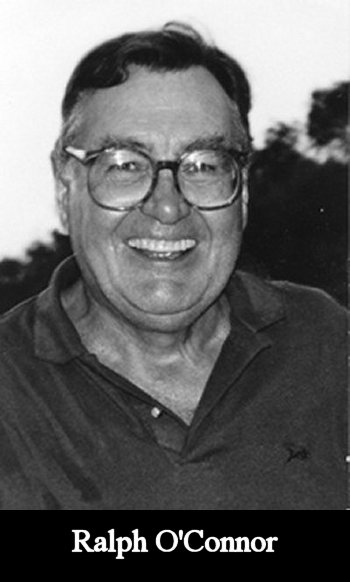 |
So now we know the
origin of my college scholarship.
Considering I had never met Ralph O'Connor
in my life, I was stunned to receive this
incredible gift out of the blue.
Immensely grateful for this unexpected good
fortune, I could not help but notice the
similarity of my lucky break to the one Mrs.
Ballantyne had once received from the
gangster. It was very spooky how we
seemed to lead parallel lives.
But what was even
stranger was my continual blind spot
regarding Mr. Salls. I graduated from
St. John's convinced that Mr. Salls was glad
to get rid of me. That is the complete
truth. So let me clarify. Mr.
Salls probably was angry at me! Who
wouldn't be angry to do a favor only to
watch a good student make a complete fool of
himself? However, at the same time, I
think Mr. Salls guessed why I was so badly
out of control. Empathy. Based
on his own difficult childhood, he probably
knew I had to be worried out of my mind
about college.
|
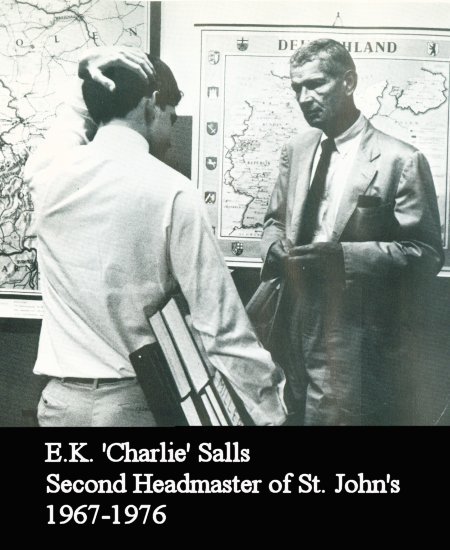 |
In
2014, I ran into Kim Salls,
oldest son of
Mr. Salls. We had a long talk about
his father. I was stunned to learn Mr. Salls
had grown up poor just like Mrs. Ballantyne
and myself. How
did he did escape the poverty trap?
Scholarships. He earned a scholarship
to Phillips Exeter and a
scholarship to Harvard.
[sound familiar?]
Imagine his
surprise when
Mr. Salls met a St. John's student who reminded him of himself. Mr. Salls
took the trouble of asking Ed Curran, an
English teacher I often confided in, to
learn more about me. Mr. Salls was amazed to learn my childhood was just as tough as
his had been. Reminded of his past,
Mr. Salls felt the same kinship towards me as
Mrs. Ballantyne. Well aware of my
father's history with the school, he realized
the financial bind I was facing and quietly arranged to help.
Kim Salls was a
godsend because he was able to make me see
why his father had been so furtive.
Were it known that the Headmaster arranged
scholarships for SJS students, the line
would be out his door. That is why his
father preferred to operate in total secrecy. As it turned out, Mr.
Salls had been saving a scholarship to Johns Hopkins
for me all year long.
That is why he badgered me to apply to
Hopkins back
in September. That is why he
decided to overlook the cheating incident.
That is why he gave the Jones
Scholarship to Katina instead of me.
When I lost to Katina,
it never crossed my mind that Mr.
Salls was saving a larger grant for me? Like I
said, I thought Mr. Salls hated me after the
cheating incident. Nothing could be
further from the truth.
Mr. Salls was
not my enemy, he was my benefactor.
Both
he and Mrs. Ballantyne took me under their
wing for the same reason. They both saw
something in me that reminded me of
themselves. Why did they want to help?
Because once upon a time someone had helped
them with a profound Act of Kindness.
When you cannot repay those who
helped you get started, Pay it Forward.
|
It had been a privilege to
witness how Mrs. Ballantyne handled the sensitive
subject of her daughter's award in such a classy way.
I was impressed with her style. She had shown
me how effective it is to bring awkward issues out in the open.
By caring about me enough to share her personal
story and discuss a risky subject involving her
daughter, Mrs. Ballantyne had immeasurably softened
the blow of losing the Jones Scholarship. "And
the truth shall set you free." The
subsequent healing was extraordinary.
In the days following our
conversation, I wondered if Mrs. Ballantyne realized
what a chance she had taken. Although I knew I would
never hurt her, why did she trust me? She
could see I was unstable. She could tell I
was ready to explode. Once I told her
about my problems with college finance, surely she
sensed I might blame her for losing the Jones
Scholarship. After all, I had lost the
scholarship to her own daughter.
What if I had gone berserk and started screaming at
her?
Mrs.
Ballantyne chose to ignore the threat. Resolute and fearless,
she patiently explained the background story even
though she was under no obligation to do so.
It was a
magnificent gesture to take me into her confidence.
Would any other woman in the same position have done
so? Hard to say, but probably not.
Incredulous at
how direct Mrs. Ballantyne had been, I was very impressed.
I had never seen someone take this approach
before. I could not help but recall
the damage my father had caused by avoiding the
touchy subject of college. Nor could I forget how my mother
had destroyed my Senior year by refusing to openly
discuss the financial problems that led to
Little Mexico. The comparison in
parenting skills was night and day. Given this
command performance on how effective parents
operate, I had found the perfect role model.
If I was ever fortunate enough to have children, I
made a solemn promise to emulate Maria Ballantyne.
|
Every kid needs a hero and I
had found mine.
However, there was one thing I
was very unhappy about. Although I was
thrilled to finally meet the lady I had admired for
nine years, the Supernatural overtones of our
meeting left me very disturbed. The way we had
met was so eerie, I had no choice but to consider
the Hidden Hand of God for the second time in less
than a month. In
light of similar thoughts concerning the
near-impossible way
I had been caught cheating, something very strange
was going on in my life. Now that I had met
Mrs. Ballantyne, she was the only adult I trusted to
ask for insight on the unusual and quite scary
subject of Divine Intervention.
Unfortunately, I never got to ask
my questions. Although the school year still
had two months left, we did not speak again.
That is because Mrs. Ballantyne seemingly
disappeared after our parking lot conversation. This was
mostly my
fault. I should have tracked her down at
school, but I was too shy to do something that bold
with such an important woman. Since our paths
normally crossed once a
week over the past nine years, I assumed I
would run into her eventually. For this
reason, I failed to seek her out until it was too
late. I did see her a couple times, but always
from afar. The few times I spotted Mrs.
Ballantyne, she was on the other side of our
Quadrangle two hundred yards away and I had to get
to class. I noticed her briefly at Graduation, but
I was seated. After the ceremony,
she disappeared in the crowd. With a
sigh, I assumed I would never speak to Mrs.
Ballantyne again.
Which was a shame. I really liked her.
|
Shakespeare said the world is a stage
and we are but the actors. In that
sense, Mrs. Ballantyne had made a brief but
powerful cameo appearance in my life, worked
her magic, then vanished.
Her unlikely disappearance served to further
enhance the mythical aspect of our
conversation. Since I was unable to
get Mrs. Ballantyne's viewpoint on what had
taken place, I had no choice but to
analyze the
Supernatural overtones on my own.
To me, the entire episode seemed ripped from
Cinderella. The poor
girl
is miserable. She has reached the lowest point of her life.
Poof! A Fairy Godmother appears out of
nowhere and encourages Cinderella to pour her heart
out. The Fairy Godmother listens
to her story, then waves her
magic wand. Poof! Cinderella is transformed.
With her duty done, Cinderella's Fairy Godmother vanishes.
Poof! The Fairy Godmother is never seen again.
I was
desperate to know
HOW and WHY the woman I had secretly selected
nine years ago
as the world's best mother had appeared as if by magic to release me
from a terrible burden. Alas, my personal Fairy
Godmother was gone. In the absence of any sort of
Realistic explanation, I was left to dwell
on the Supernatural nature of our amazing
conversation all by myself.
Unable
to put the mystery to rest, this was the
start of an intense three year spiritual
journey.
I was so profoundly
moved by the experience, our visit
ultimately became the foundation of my
belief in God.
|
 |
According
to various polls, the jury is
out regarding the existence of
God. Only 50% are fairly
certain that a higher power
exists. Given all the evil
in the world, I can certainly
see why a person would be
skeptical. Fortunately,
thanks to Maria Ballantyne,
there is no doubt in my mind.
I consider her
intervention to be the closest
thing to a Miracle I have ever
witnessed. I would like to
share how
I reached my conclusion.
Mrs. Ballantyne practically lived at St.
John's. Due to seven children,
Mother's Guild responsibilities, plus
her fondness for afternoon tea with
fellow SJS mothers, she was
always around. Back in the 4th
Grade, I saw her frequently because
afternoon tea was held in the
Commons Room right next to my hallway locker.
Every afternoon I stared at Mrs. Ballantyne
like a worshipful puppy dog. Over
the years I
continued to study her from afar every chance I got. In addition we
passed each other in the hall once every two weeks or so. Over the
course of nine years, by the laws of
random physics we should have bumped into each
other sooner or later. Or at least
shared eye contact. Nope. It never happened.
Not once. And yet the moment I was
locked in the worst crisis of my life,
the woman I considered the world's finest mother
appeared like a
Fairy Godmother to the rescue. The
Timing could not possibly have been more
critical.
How does one
know what kind of odds can be
assigned to a coincidence of this
magnitude? It is impossible.
However, the phrase "One in a
Million" is a good place to
start.
Personally, I think the
odds were greater than that.
|
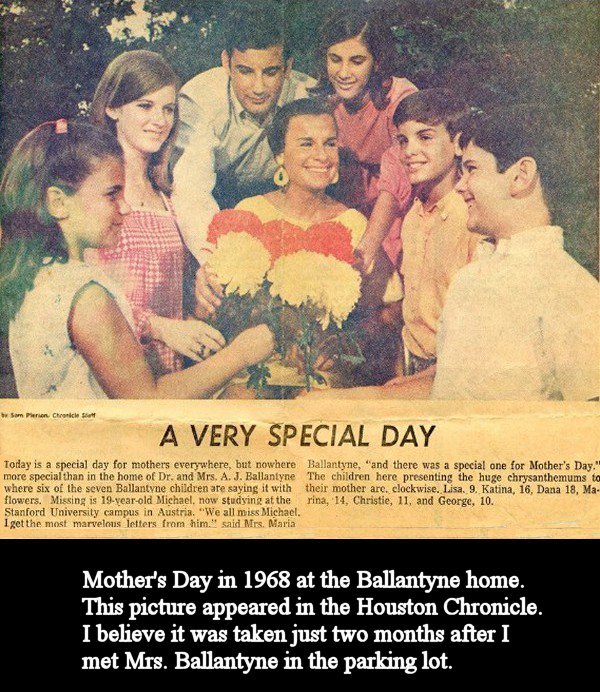 |
Given the
seriousness of my crisis, I felt like
Mrs. Ballantyne had saved my life.
That is more than enough Impact, but why
stop there?
Oddly enough,
shortly after
graduation
I experienced two
more serious Coincidences plus a
near-death car accident. One
coincidence involved the mysterious
appearance of a last-minute date for my
Senior Prom. The other coincidence
involved the unexpected sighting of my
college girlfriend getting on a train
with a new boyfriend. Factor in
Bob Franklin's cheating coincidence and
Mrs. Ballantyne's Fairy Tale
coincidence, that was five unsettling
events within a seven month period.
If I added up the combined improbability
of all five, the odds approached
Infinity. Emily had decided to
visit New York without telling me.
No doubt she never imagined I would show
up at the train station to discover her
duplicity.
I am one of those "things
happen for a reason" people.
Why would God
slap me in the face with this vivid
demonstration of my girlfriend's
betrayal? Maybe God wanted me to
consider the deeper implication of these
mysterious events.
" The
more frequently one uses the
word ‘Coincidence’
to explain bizarre happenings,
the more obvious it becomes that
one is not seeking, but
rather
evading the real explanation."
--
Robert Anton Wilson
Unable to get
these strange events out of my mind, I
began a prolonged search for the
meaning of life. After three
years of analyzing every detail of the
various coincidences to the
nth degree, I became convinced the
laws of Reality were insufficient to
satisfactorily explain the underlying mysteries.
And so
my search became the foundation of my
belief in God.
|
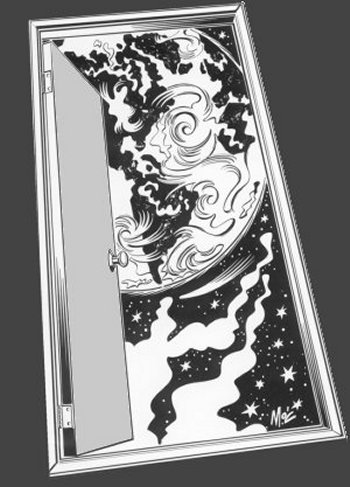 |
This story
was off the charts for "Weirdness".
This is
a word I use whenever I try to
describe
some aspect I think might be "Supernatural"
in origin. What would the
movie tagline be?
"At
the moment of a young boy's
greatest trouble, a woman he
has secretly admired his whole life magically appears to
open his Door to Destiny. Based on a
true story."
I remember
what passed through my mind as
Mrs. Ballantyne drove away after
our long talk.
"I
must be crazy! This
was not some random person out of nowhere
who came to save me,
this was the most talented
mother on earth. If I had
been given a choice, I could not
have picked a better person to
help. Now for the life
of me, I cannot stop thinking
about her. What could
have possibly brought this lady
to my side
at such an important moment?"
In 2005, a friend of mine
named Keller Moot read an earlier version of
this story.
Although Keller loved the story,
he had trouble accepting
that Mrs. Ballantyne had shown
up at the grocery store by
accident. Before he could fully
accept the obvious spiritual
implications, Keller had to be
convinced there was no 'Realistic'
explanation for her mythical
appearance. After
several
tentative inquiries over a
two-week period, one day Keller
abandoned his "one question
at a time" approach.
Seeing I was not busy, he confronted
me with his
suspicions.
"Rick,
I cannot accept that Mrs.
Ballantyne showed up by
accident. I believe Mr. Salls
must have
told her
something in advance to inspire her
visit to your grocery
store."
|
With a
smile, I told Keller I had asked
myself this same question a
million times.
"Keller,
the answer is no. I cannot
think of a single explanation
that makes any sense in
Realistic terms other than it
was a once-in-a-million accident. Mrs.
Ballantyne had no business
coming to a store so
far out of her way. If Mr.
Salls had tipped her off in
advance, she
would have introduced herself.
But instead she had no idea who
I was. Given the blank
look on her face, I was a total
stranger to her. She was
there to shop, not to see me.
For this reason I am convinced
no one tipped her off in advance
where I worked."
"Well,
what about her daughter?"
"Katina
was always cordial to me, but we
were not friends. Even
though our lockers were side by
side alphabetically, I cannot
recall a single time we spoke on
a personal level. She had
no idea what my story was nor
did anyone else. Why would
she speak to her mother?"
|
Keller was
not convinced. "What about
your teacher friend Mr. Curran? Maybe he said
something."
"After I
got caught cheating, I stopped
speaking to Mr. Curran. I
was too ashamed to admit what I
done, so I avoided him.
Other than my friend David, no
one in the school had any idea
how important the Jones
Scholarship was to me.
Besides, if someone passed on a
tip to Mrs. Ballantyne, why
would she go to the trouble of
tracking me down at a grocery
store? All she had to do
was find me in the St. John's
hallway."
"Can't
you think of anything?
To me, your story is beyond
weird."
"Look,
Keller, I agree with you.
I spent three years in college
trying to figure out what really
took place, but in the end I
could not come up with a single
Realistic answer. It
defies the imagination. Why would a
prestigious woman give an
hour of her time to a total
stranger unless some kind of
spark drew her to me? The time we
spent together was so powerful
that it changed the direction of
my life. I was just as
awestruck by Mrs. Ballantyne as
St. Paul must have been the
day Jesus blinded him with
light, then opened his eyes to
the truth.
That is how important this
moment was to me."
|
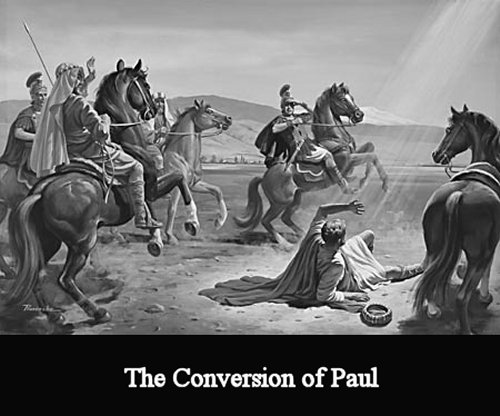 |
Keller
thought it over, then begrudgingly nodded in agreement.
I knew exactly what was going
on. It is very scary to
accept that God plays a direct
role in our lives. But
there comes a time when the
facts make it clear there is no
other choice.
"Okay,
Rick, I see your point, but I
had to ask. Now I have
another question. If there
is no Realistic explanation,
then do
you have an Un-Realistic
explanation for what brought her
there?"
"I have
two
theories, both of which are off
the wall. One theory
suggests that God, or an agent
of God such as a guardian
angel, sent this lady to my side
via telepathic message.
Mrs. Ballantyne's husband worked at the
Medical Center, so maybe she
passed by my store on her way
home after visiting him.
Another possibility was the
nearby Annunciation Orthodox
School. She was on the
school board. In that case, her most direct route
home would have been Alabama
Street. This would have
taken her right past my store.
A timely telepathic suggestion that she
"urgently" needed groceries did the rest.
My grocery store was as good a place
as any, so she turned in."
"What
is your other theory?"
"My other
theory is based on something
Mark Twain said. His
interest in Coincidence was
well-known. "Ah, what a
delightful thing a coincidence
is! There isn't anybody to
whom that mysterious conjunction
which we call a coincidence is a
matter barren of interest."
Twain
encountered so many
coincidences, he reached the
point where he could no longer
continue to dismiss them as
curious accidents. Fed up
with people who constantly
downplayed bizarre coincidences
as silly and unimportant, he
decided most people avoided the truth
because they feared
spooky Occult explanations.
He proposed a theory called 'Mental
Telegraphy', a term I
suppose is what we call ESP.
"I
believe a
mind can act upon another
mind in a quite detailed and
elaborate way over vast
stretches of land and water.
Somehow one mind can
influence another mind
through thought alone."
-- Mark Twain
Mark Twain
believed we are all connected at
the level of the Soul. I
happen to agree. In Real
Life we were strangers, but at a
deeper level Mrs. Ballantyne and
I were linked. Carl Jung
said something similar, calling
it the Collective Unconscious. I think
there is a distinct possibility
that in my time of need, some
deeper
part of me telepathically
summoned the finest mother I had
ever met to my side."
Keller
replied, "Most people would dismiss an
explanation like Mental
Telegraphy."
I nodded.
"Yes, of course they would.
Given how far-fetched my theory
is, I can certainly see why.
However, I cannot get the
allusion of a Cinderella-like
Fairy Godmother out of my mind.
Here I am headed to the edge of the
cliff and suddenly this amazing
woman comes out of nowhere to
lift my spirits.
Her effect on me was so profound
that I decided Mark Twain was
right. Mrs. Ballantyne and
I must have had some sort of mystical psychic
connection that defies
understanding."
"How
did it feel when she began
to tell you her life story?"
"I was
absolutely stunned. But
first I have question.
Keller, who's your greatest
hero?"
"President Kennedy."
"Perfect.
Me too by the way. So you
meet President Kennedy out in
the woods in the middle of
nowhere. That's crazy
enough. He has a million
better things to do, but instead
he takes an immediate liking to
you and strikes up a
conversation. That's even
crazier. Next thing you
know, he's telling you his life
story. How would you
feel?"
"I
would be blown away."
"Exactly.
But here's what makes it even
stranger. Right before I
met Mrs. Ballantyne, her
daughter won an award that
rightfully should have gone to
me. There was only one
person in my entire graduating
class that I had any energy on
and it was Katina of all people
because her mother was so
important to me. And
here's another thing.
Okay, so one week later Katina's
mother shows up at my grocery
story. That does not
explain why she instantly felt a
strong connection to me.
This incredibly busy woman
sacrificed nearly an hour of her
time to help a boy she had never
met in her life. When you
add up all the strange elements
of this story, the long odds
begin to approach Infinity."
"In
your story, you did not come
out and say it, but the way
you described what happened,
you made it sound like you
considered this
a Miracle. Is that what
you think?"
"To me, it
all boils down to Faith. I
cannot prove this was a Miracle.
However, given the Impact this
experience has had on my life,
this incident was the reason I began to
believe in Fate. Given my
fascination with this
lady
from the first moment I saw her
nine years earlier, it seems
likely that Mrs. Ballantyne
was meant to play a special role
in my life. Or maybe I was
meant to play a special role in
her life. Some people say
Coincidence is a small miracle
where God prefers to stay
anonymous. Others
may have their doubts, but to
answer your question, yes, I
think Mrs. Ballantyne's visit was a
Miracle."
|
THE POWER OF
a "simple act of kindness"
|
Rick Archer's
Note:
This concludes
the first chapter of my book Pay it Forward.
For those of you who are too busy to read the remaining
seven
chapters, but would like to know what happened next, consider the
following segment to be a Sneak Preview.
|
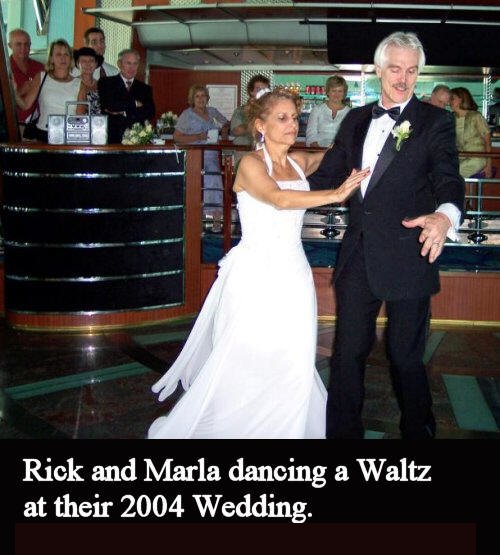 |
I have
written three books that span 65
years of my life. As it turns
out, Maria Ballantyne plays a
recurring role in each
book.
My first book, A Simple Act of
Kindness, shares the details of high
school at St. John's, college at
Johns Hopkins, and graduate
school at Colorado State
University. In this book,
I cover the events that led up to my dramatic meeting with
Mrs. Ballantyne in greater detail than Pay it Forward.
My second book, Magic Carpet
Ride, covers the story of the unlikely coincidences that
led to my dance career. Mrs. Ballantyne has an
entire chapter dedicated to her where I spent the entire day
with her. This chapter also
appears in Pay it Forward.
My third book,
Gypsy
Prophecy, covers the story of the mysterious coincidences
that led to my marriage to Marla, the love of my life.
It turns out that Marla met a Gypsy who gave Marla a
choice. If she wished, there
was an excellent chance she could revive
her six-year relationship with her
current boyfriend. On the
other hand, if she decided take a
certain journey she had been
considering, she would meet the man
she would spend the rest of her life
with. As it turns out, Mrs.
Ballantyne's brother George played a
major role in this truly amazing
story.
In 2013, I learned a secret about Mrs.
Ballantyne and her billionaire brother George that only I
knew the significance of. There was no way to go back
and rewrite the three previous books to include this
new information. Besides, no one would understand the
full significance of the role Mrs. Ballantyne played in my
life given that her appearances were scattered over three
books. For that reason, I wrote Pay it Forward
specifically to share Maria Ballantyne's complete story as
well as the story of her brother George.
|
Regarding
A Simple Act of
Kindness, as it
turns out, Maria
Ballantyne gave me the title for
this book. Ten years after
we met in the parking lot of my
grocery store, we met again
under unusual circumstances.
During our second conversation,
she uttered her immortal "Act of Kindness" phrase.
As I wrote
earlier, Mrs. Ballantyne disappeared
following the 1968 Parking Lot
Coincidence even though two
months remained in the school
year. Saddled with
important questions, I was
beyond frustrated to miss my
chance to ask if she had sensed the same
Supernatural implications as me. I was also
sad. Now that we had
become friends, once I graduated
I assumed I would never see her
again. Let's face it, she
was rich and I was not. We
traveled in much different
social circles.
Fortunately I was wrong. Ten years later
Mrs. Ballantyne reappeared
out of thin air.
Lacking any obvious reason
to explain our latest
connection, our
second meeting was just as much
an eerie coincidence as the
first. Surprised, we both grinned in
quiet acknowledgement that there
is more to this world than meets
the eye.
Fortunately, this time I was not
locked in crisis. In fact,
I had just begun a second job as a
part-time dance instructor. I was
having so much fun, I secretly
hoped this could turn into a
career (and it did).
Mrs. Ballantyne
had long wondered whatever
became of me. She was so
pleased to
see me again, she invited me to lunch at her house later the
same day. During the
meal, I filled her in on my
past ten years.
Now it was her turn. She beckoned me
into her living room, then proceeded to tell me
her life story in far greater
detail.
Here is a
brief excerpt. (You can
read the full story in the next
chapter of this book).
|
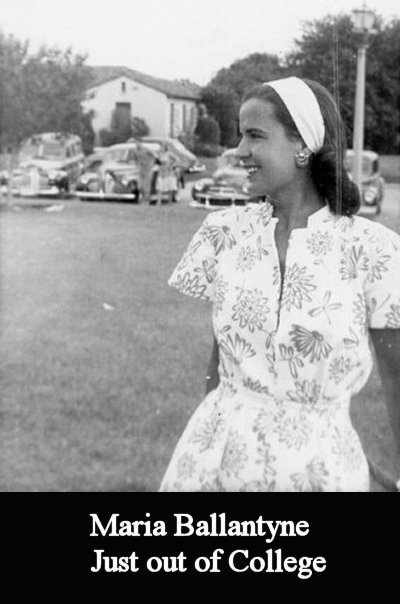 |
Maria
Ballantyne was born on Christmas
Day, 1920. It was now
1931. Following the
tragic death of her mother, Maria moved to a house
with a strange
secret. To the casual
observer, this two-story
building was a restaurant
downstairs and a living area
upstairs. But what about
that side door in the restaurant
guarded by two men at all times?
Curious to know why
a continuous parade of tough-looking men and
scarlet
women kept going
in and out that door, Maria tried to enter
only to be stopped by the
guards. It took a while,
but Maria eventually figured out
this mysterious door served as
entrance to a hidden casino and
brothel. She had just
discovered her new home was a
front for the Galveston mob and
that her aunt's
restaurant was one of their favorite
hang-outs.
That included Sam Maceo,
the powerful head of the Galveston
Mafia.
|
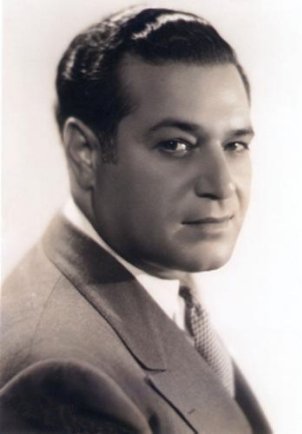 |
"Mrs.
Ballantyne, back when we first met
ten years ago, you said a gangster paid your way to college.
However, you hesitated sharing further details.
Would you be willing to tell me the story?"
"When
we met in 1968, I did
not know you very well, so I was cautious.
My
children are grown now, so I don't care what
people think anymore. His
name was Sam Maceo. He knew
me because my dissolute
father occasionally did small jobs for
his syndicate.
In addition, Mr. Maceo
visited my uncle's restaurant on occasion because he had one of
his gambling and prostitution operations hidden
behind a well-guarded door.
Since I lived upstairs, I had to
cross through the restaurant to
get to my bedroom. Mr. Maceo
enjoyed eating at the restaurant
and would see me. He
always went out of his way to greet me. I was 11 at the time.
He knew my mother had just died
and he also knew my father had
forced me to live with my
aunt, then abandoned
me. I think Mr. Maceo felt sorry for me."
Mrs.
Ballantyne winced noticeably.
No doubt it hurt to talk about this difficult time
in
her life.
"I always thought
gangsters were dangerous men. You
weren't afraid of him?"
"No. Sam Maceo had a
reputation more as a businessman than a
gangster. He was not known for bloodshed.
Once he gained power, he ruled his domain with
benevolence, not so much with threat. It
was kind of funny. This was the
Depression, but thanks to him, Galveston was
doing very well. Everyone knew he
brought so much prosperity to the island, the
police had no trouble whatsoever turning a blind
eye."
"How did you meet him?"
|
"My father
was a real jerk. Noting
how my father was preoccupied
with gambling and chasing women,
Mr. Maceo did not approve of his
behavior. A firm
believer in Family, he was disgusted
by my father's
neglect of duty. Mr. Maceo would
spot me as I walked through the restaurant after school and smile
at me. I was so lonely, I loved the attention. I
would always smile back. Then
one day he waved to me and beckoned for me to come over. As I
stood there trembling at his booth, Mr.
Maceo
asked me how school was going and if I needed anything. I
just stared in awe.
I was much too intimidated to say a
word."
Mrs.
Ballantyne paused to laugh. With
a twinkle in her eye, she said, "Can you imagine me
being speechless about anything?" She giggled
a second time, then continued.
"Mr.
Maceo teased me about being so quiet, then asked
me my name. When I
answered, he quipped, "Ah, so
you can talk after all."
He handed me a dollar and told me
to spend it wisely. The next
time I saw him, this time I
found my voice and we talked for
a couple minutes. He
smiled the entire time. After
that, I got in the habit of going over to his table to
chat whenever I saw him. Each time he would hand me a
dollar. I was so starved for attention,
I was grateful to anyone who was willing to be nice
to me. One
day he handed me another dollar
and I told him he didn't need to
do that. When I handed it
back to him, Mr. Maceo seemed a
little miffed.
" Why
don't you want my dollar?"
he asked.
"Because, Mr.
Maceo, I would rather talk to
you for
free. "
What a
smile! He got the biggest
kick out of that. That is
how we
became friends."
|
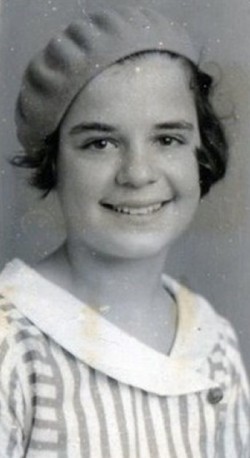 |
 |
When Maria reached high school
age three
years later, her
aunt and uncle moved to San Antonio
to open a restaurant of their own. Unbeknownst to her,
the Godfather kept
tabs. Through the
grapevine, Sam Maceo learned she
desperately yearned to go to
college, but there was no money.
College was out of the question.
[sound familiar?]
Using her
older brother George as an
intermediary, Maceo sent word that
he wished to pay Maria's way. Maria was astonished. What did
she ever do to deserve a gift of
this magnitude? Living so
far away, Maria did not see
Maceo
again. However she never forgot him. Nor did she forget that
his gift had opened her Door to Destiny.
"Rick,
the gift of a college
education was the luckiest
break of my life. Since
I was born on Christmas Day,
I am quite familiar with the
concept of Christmas
Miracles. That is what
this felt like to me. This was my
big
chance to make something of myself. I was so
grateful I have never been able to get what he did out of my
mind. I was so touched by his gesture that I promised
to make
a conscious effort to help those who
are less fortunate for the
rest of my life. But
there was more to it than
that. This man was a
better father to me
than my own father. I
was so impressed by what he
had done, I made a vow to be a better
parent to my children than
my father had been to me."
"Why do
you suppose Maceo did what he did?"
"Sam Maceo was a powerful and very wealthy
man. As
an immigrant himself, he
knew how tough it was to get
ahead in the new world.
For that reason he
liked to help children on
the island whose parents
were immigrants. On a
whim he reached out to me.
To him, it was no big deal
to help a struggling girl.
But to me, his gift meant
the world. That is why I have always
referred to his generosity
as "A Simple Act of Kindness",
small to him, profound to me."
|
Maria
Ballantyne
passed away in 2015. She was 94 at the time. Her daughter Marina wrote
a beautiful
elegy.
|
|
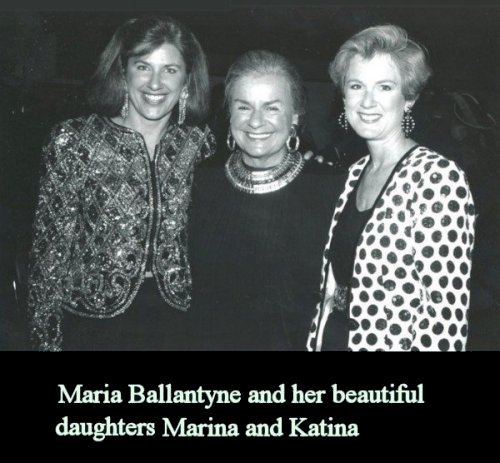
|
"My mother's
dream was to marry a man her children could respect
and to create the home she never had growing up.
That she did. We adored and respected our
father, an internationally renowned head and neck
cancer surgeon who worked at M.D. Anderson his
entire career. The warm, inviting, beautiful
home she created was constantly filled with her
children's friends, grandchildren, great
grandchildren, and people from all over the world
who lived with Mom at various times. The famous
Christmas parties she hosted for 45 years and the
pool parties for Dad's residents filled our home
with music, joy, and laughter. Our home was a haven
for those in need - from the poorest hospital
patients to royalty. Mom treated princes and
paupers the same with respect and a strong dose of
her unique brand of truth serum sprinkled with a
sailor's vernacular. Waiters, bus boys,
parking attendants and shop owners would run to kiss
her because she saw them - really saw them - and
made them feel special.
Mom's civic
activities included The Park People, Blue Bird
Circle, and the Annunciation Orthodox School Board.
She could beat all seven of her children at tennis,
and, as legend has it, even beat her brother George
when he was captain of A&M's tennis team. But her
main focus was always her children and their
families. She was a fixture at St. John's School
where she and our father cheered zealously at her
children's sporting and music events. No
mother could have given more to her seven children
and their spouses, her 21 grandchildren and their
spouses, 11 great grandchildren, 12 of her brother's
nieces and nephews and their families, her
Ballantyne in-laws and 20 nieces and nephews and
their families, plus her "adopted" children
she leaves behind. The outpouring of love
extended to her by all of these in her last days is
the greatest testament to a life well lived and a
heart that loved completely. Her consistent
message of the importance of family, gratitude,
persistence, forgiveness, and unconditional love is
imprinted on her heirs and will echo for
generations to come."
|
"My
mother's
message...
will echo for generations to come."
What an
eloquent way to put it. As Marina made
clear, her mother dedicated her life to
spreading Kindness as far as she possibly
could. It is amazing to think how
many lives this remarkable woman touched.
One of those lives was mine.
Perhaps
the Reader noticed Marina's comment about
her mother's
"adopted children".
Given that Marina was familiar with my
story, I have a hunch that phrase was
a sly reference to me. Over the
course of 50 years, I would meet with Mrs.
Ballantyne on six occasions. Other
than my final visit when I asked to speak to
her concerning her feelings about appearing
in this book, every encounter was a
complete surprise to me.
Here is what
is odd. Each time we met she would
eagerly share new revelations about
her past. Not a moment was wasted on
small talk; no prompting was ever
necessary. As I
listened, I
could not help but wonder why she was so
willing
to share such deeply personal information
with me. To be honest, I rarely got
a word in edgewise. I did not mind, of
course, but I am also serious. 99% of
the time all I did was listen.
"Why
does she trust me so much?" I asked.
Indeed, Mrs. Ballantyne trusted me from the
moment we met. Although I loved
listening to her stories, there was a
downside to our conversations. Given
that I would not dream of interrupting her,
I was never able to ask questions concerning her
personal views about God. Instead I
took dictation in a manner of speaking.
Given that she never directly addressed our
strange bond, I have no choice but to
speculate why she shared so freely.
|
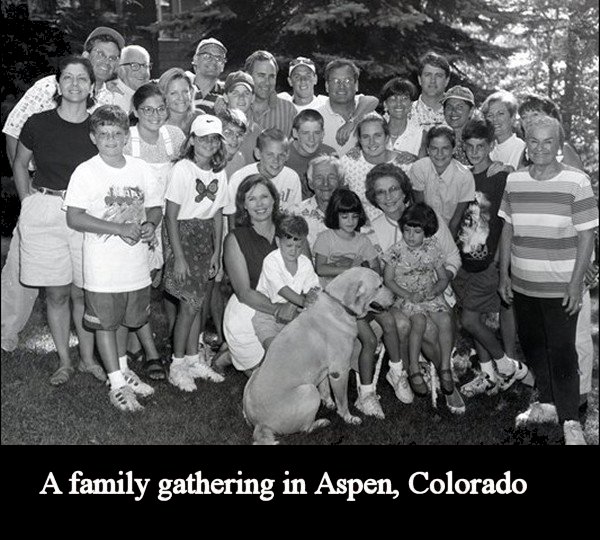 |
Here is my theory.
From where I stand, Maria Ballantyne was
given a life mission to pass on the message
of kindness and charity. One
motivation was
gratitude born of the example set by Sam
Maceo. Others might say it was
Divine Inspiration to pay Maceo's gift forward.
Among the many lives that Mrs. Ballantyne
touched, I think I was given the
unique role to become her biographer. Given how perceptive she
was, surely my friend took note of the same
spiritual implications of our 1968 meeting
as me. Then something equally unusual happened
when we circled back in
1978. Our day began with another one
of those "What are YOU doing here!?"
kind of coincidences.
The moment I saw her,
my Supernatural
Alarm Bell went off. I imagine
Mrs. Ballantyne was just as disconcerted as
I was.
When
we sat down for lunch later in the day, I had my
Reality-testing equipment working overtime.
Given the strange mood I was in, I wanted to share how she had inspired my spiritual
journey in college. I also wanted
to ask what she thought
about God, Fate, and Miracles.
However, keep in mind I
barely knew this lady. Although we
had participated in a Miracle together (or
at least I thought so), I had no idea if
she shared a similar wavelength. Plus
I had this woman up on a pedestal.
Given how intimidated I felt in her
presence, I lacked the courage to address such
sensitive topics.
So I substituted the
coincidence of our matching college
scholarships instead.
|
"Mrs.
Ballantyne, when we first met, you said my childhood
reminded you of your own experience. Two weeks
after we talked, a man I had never met in my life
handed me a full scholarship to college. Now
we can add that to our list of childhood similarities.
We can both say the unexpected gift of a
college scholarship was the luckiest break of our
lives."
Mrs. Ballantyne
did a double-take. What do you
suppose crossed her mind? This is just a
guess, but in that moment perhaps she sensed how
strange it was for us both to be
the beneficiaries of
identical and quite remarkable Acts of Kindness.
How often do strangers offer a college scholarship
to someone they barely know? The odds of this
coincidence was so rare, it is possible at some level, conscious or otherwise, this
information
confirmed her hunch that we were linked.
If
so, that might explain what happened next. Mrs.
Ballantyne invited me into her living room and
proceeded to tell me her life story in far greater detail.
Why would she do this?
I think Mrs. Ballantyne
had decided to pass the torch. In 1938 Sam Maceo touched Maria with his Act of
Kindness. In 1968 Maria turned
around and touched me with her Act of
Kindness. Now in 1978 Mrs. Ballantyne
sensed I might have been given a special duty to carry her legacy
forward. If so, the more I knew about her, the
better prepared I would be to spread her message
forward.
|
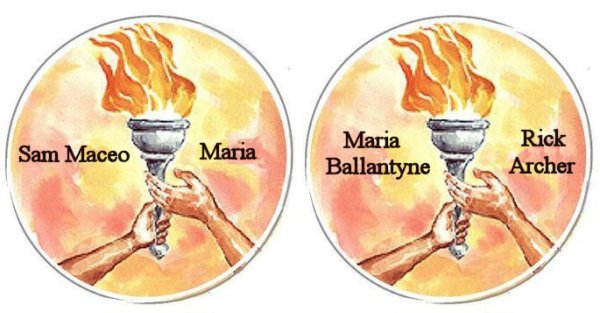 |
Forgive me if I have overstepped,
but there had to be a purpose to her methods. For
sake of argument, let's assume I am right. If so,
was
I consciously aware she was passing a
torch? No, or at least not when we spoke in 1978.
But then we kept on meeting. 2005. 2009.
2010. Each time she would
resume as if there had been no passage of time. I
realize
it is
presumptuous to assume I know what passed through her mind.
Nevertheless, for whatever
reason, she was clearly intent on imparting her message.
Was making me her biographer a conscious decision?
I doubt it. But I do believe "Fate" selected me to be
her biographer. It
makes perfect sense.
Why else would she take me under
her wing?
By sharing her life story with me, I could extend
the ripple effect of her amazing message of Kindness.
Indeed, after she passed away,
I learned there was another amazing fact to this story that
only I am in a position to share (a future chapter in
this book). If I did not speak up, then no one
would
ever know this fascinating piece of history. For
that reason, I believe I was given a duty.
Just to be clear, I make no claim of
omniscience. What I do claim is my
unusual experiences with Mrs. Ballantyne give me
the moral right to raise these
possibilities.
In addition
to becoming Maria Ballantyne's biographer, I have passed her message on
in a different way. Our 1978
conversation took place at the very start of my dance
career.
As my life unfolded, over the next 32 years I would create the
largest dance studio in America.
Considering the long-shot odds against such an
accomplishment, I believe I was the beneficiary of a considerable
amount of Divine assistance.
If so, why?
By placing me in position where I could share her message with half a million students, I was able to carry on the legacy of Kindness
handed from Sam Maceo to Maria Ballantyne, then handed to me as well as
to her talented children.
"My
mother's
message...
will echo for generations to come."
|
A LOOK BACK
AT ST. JOHN'S
|
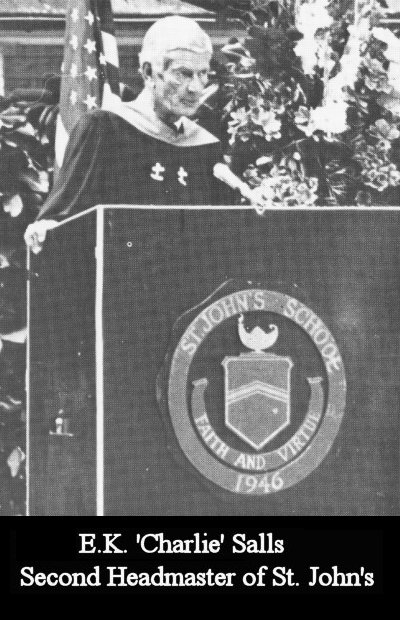 |
In 1968 I was the beneficiary
of not one, but two "Simple Acts of Kindness". One
benefactor was Mrs. Ballantyne, the other was Mr.
Salls. In 2009 Mrs.
Ballantyne revealed the truth behind the mystery of
my scholarship to Johns Hopkins.
Christie Ballantyne, one of
Maria's four sons, had asked for lessons in Swing
Dancing.
One night Christie and his lovely
wife Yasmine
showed up with a surprise guest.
Mrs. Ballantyne watched her son's lesson with
considerable glee. She had been a Swing dancer
herself during the Big Band Era.
When the lesson ended, I put on music and
told the couple to practice. Then I made
a
beeline to my friend for a joyful reunion.
As usual, without prompting
Mrs. Ballantyne launched into memories of the past.
She reminded
me that Sam Maceo's gift was the key to her
breakthrough. His
gift of a
college education had allowed this young woman to
enter an entire new world, a world which would include her
wonderful husband and children. However, by the time
she discovered the full impact of Maceo's gift, her
benefactor was long gone.
Unable to
directly thank Maceo for his help, she decided
the best thing to do was find others who needed
help and pay her gratitude forward. She
concluded with a bombshell.
"Isn't it strange that we
were both recipients of college scholarships
that took us totally by surprise? I am so
glad that Charlie was able to help you."
"Charlie?" I was
astonished. Only the closest friends of my
formidable Headmaster had permission to call him by
his nickname. This was how I learned that Mr. Salls was one
of Mrs. Ballantyne's best friends. Upon
further questioning, Mrs.
Ballantyne revealed how Mr. Salls had secretly
arranged my scholarship with Ralph O'Connor, the
wealthy oilman turned philanthropist. I was stunned beyond my
wildest imagination. I had graduated in 1968
under the misconception that Mr. Salls was furious
with me following the cheating episode.
Completely fooled, I had no idea that Mr. Salls was
in reality the great benefactor of my life.
Dumbfounded, I sat there too choked up to say a
word. Knowing that Mr. Salls had passed away
in 1985,
I was filled with an incredible sense of regret.
How would I ever be able to thank him? The
answer was clear. Pay it Forward.
|
Seeing me lost in thought, Mrs. Ballantyne broke
the silence with an unusual
observation.
"Rick, considering how
bitter you were when I
met you back in
high school, it is
amazing to me you didn't
end up in Montana
writing a manifesto to
justify bombing innocent
people.
I am
so grateful you turned
out differently than
these fools today who
think their problems can
be solved by hurting
others. Boo hoo
hoo, so life is tough!
Get over it! Skip
the pity and do
something positive with your
life. Instead
these morons go to a
school and murder
defenseless children.
What does that
accomplish? So now
I'm curious.
Considering all your
problems, how did you
ever manage to turn out
okay?"
I
nodded. I knew exactly
what she was getting at.
"Mrs.
Ballantyne,
my school gave me a fighting
chance in life. For
that reason
I never dreamed of hurting
someone at St. John's.
I admit I was angry over how
lucky my classmates had it,
but I knew my problems were not
their fault. Besides,
even in
my darkest moments during my
Senior year, I loved my teachers. My respect for
them was off the
charts. Not only did they
instill a burning desire
for achievement, several
teachers
went out of their way to
be better parents to me than
the ones I had. They
made a huge difference.
Mr. Chidsey gave me a
scholarship and Mr. Curran
invited me to his home for
long talks. Now you
tell me that Mr. Salls sent me
to college.
Thank goodness
he
trusted there was more to me
than my awful behavior.
Yes, I was a bitter kid, but
not towards St. John's.
The color of my blood will
remain Red and Black till I
die."
|
 |
A FIGHTING CHANCE IN LIFE
|
I have made the claim that I
was given the responsibility
to pay Maria Ballantyne's
legacy forward. If so,
how did I accomplish that?
Maria
Ballantyne and
Charlie Salls were not
alone in their concern for me. As I told Mrs.
Ballantyne, there were several
teachers at St. John's who stepped forward to do the job my parents were
incapable of. These exceptional people gave of their
heart without any expectation of reward in
return. Without their help, I would have never
made it out of childhood with even a semblance of sanity.
However, there was only so much these kind and decent people
could do. Given the profound emotional problems caused by my
parents,
I did not escape my childhood unscathed. My
shyness, my problems with authority, my lack of experience with girls and
my
sense of
social inferiority would come back to haunt me time after
time.
Personally
speaking, I would have greatly
preferred an easier childhood.
However, as I explained to Mrs.
Ballantyne, where would I have been
without St. John's? In the
grand tradition of Nietzsche's "That
which doesn't kill you",
I could see my time at St. John's had forged a
strong determination to persist even though the odds were
against me. Considering the serious reversals I
would face in the future, there was no guarantee I would
succeed. Thankfully, the lessons learned at St. John's had
given me a fighting chance.
|
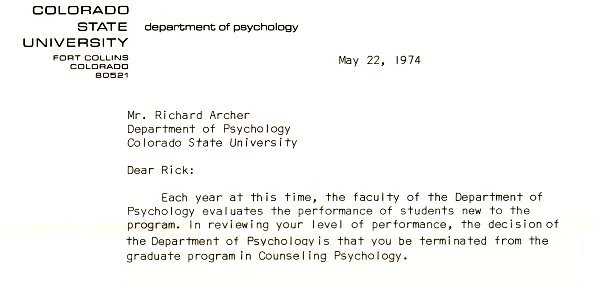 |
Speaking
of those emotional problems, in 1974 I was thrown out of
Graduate School.
In Hindsight, given my childhood I
guess I should not have been
surprised. So what went wrong?
During my college years, I had spent
untold hours thinking about the
Parking Lot Miracle. After a
great deal of thought, I developed
a
strong faith in God. As part
of my conversion to a spiritual
path, I told God I
wished to help people in much the
same way Mrs. Ballantyne had once helped
me.
I
decided to become a
therapist.
Although this was
a noble ambition, it turned out I was unsuited for
the role. Observing that
my childhood problems
had turned me
into an emotional cripple,
the head of the
department
decided I was too unhealthy
to be trusted with
others. So he sent me
packing. It hurts to
admit, but given how screwed
up I was, perhaps he made
the right decision.
Nevertheless, I was beyond devastated.
|
Here's the sad
thing. My heart was in the
right place. If they had given
me the same kind of second chance
that Mr. Salls bestowed after I
cheated, I very well
could have rewarded their patience.
But here is what is strange.
Little did I know there was
something far better waiting for me
down the road, the chance to create
my dance studio. For that
reason, perhaps my graduate school failure was
part of God's plan.
There was
also a silver lining. During
my year in the Psychology program, I
saw a gifted therapist.
Together we began the long
process of repairing the damage from
childhood. In
other words, yes, I was crushed to
be sent packing, but in a manner
similar to St. John's, my time with
the therapist
gave me a fighting chance to
face my next set of obstacles with at
least some
chance of success.
Hitting Rock
Bottom with a giant thud,
I was locked in
the worst depression since my Senior year
Crisis. Unfortunately,
this time
there was no
Maria Ballantyne to pick me back up.
Struggling
to regain my confidence
following Graduate School, I found my
answer in the strangest of
places. On a visit to a
bookstore, I ran across a used
$1.00 paperback with a weird title,
The Mistress Book.
Given that I
owed my elite nine-year
education at St. John's to my
father's mistress, I could not
resist a peek.
The book
contained an interesting
suggestion.
"The fastest polite way to
get a woman he doesn't know
in a man's arms is to ask
her to dance."
Given my
frightening lack of experience
around women dating back to high
school, the thought of using
dance to place a woman
in my arms was a bold
fantasy.
Believing
I had been drawn to this book
for a Supernatural purpose,
I signed up for
dance lessons.
|
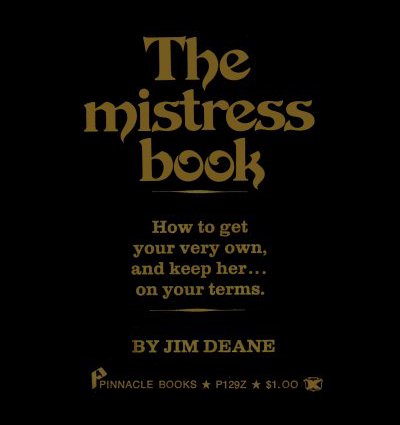 |

Unfortunately I was a slow
learner. However, St.
John's had taught me
persistence, so I refused to
quit despite my lack of progress. Three
years later, out of the
blue I was handed a modest part-time job teaching line
dances to 10 people. I did
not ask for this job. It
was just handed to me. Nor
was I very good at it.
However the stakes were low.
We weren't talking "brain
surgery" here. Even a
clod like me could teach line
dancing. I was funny and my students
liked the class, so I plugged
along in spite of my limitations.
|
Two months
later, Saturday Night
Fever took the country
by storm. Disco students
appeared out of the woodwork.
In the space of one month, I was
teaching three hours every night
of the
week. Well aware my new job
as a full-time dance teacher was a total
fluke, I was convinced this
extraordinary set of
circumstances was no accident.
To me, it dated back to the idea
in the mysterious Mistress
Book. Astonished by
my sudden good fortune,
I loved what I was doing so
much, I
told God I wanted to teach dance
for the rest of my life.
However,
that is when I second-guessed
myself.
Given my utter mediocrity,
maybe this
wasn't such a good idea after
all. Unsure where this new
job was going, believe
it or not,
I questioned God's judgment.
"Uh, God, thank you
very much, but are you
sure about this?"
Yes, I
know what you're thinking. Only Rick Archer would
be stupid enough to question God. However, I had
every right to feel this way. Goodness gracious,
it had taken me three years to become slightly better
than average as a dancer. Nor did I have any
training as an instructor. My only credential was
that I happened to be in the right place at the right
time when the movie hit town. This whole thing was
a perfect example of "Weirdness". I never asked to be a dance teacher.
It was handed to me out of thin air. Nor had I trained to be a dance teacher.
Totally unprepared for this sudden
promotion, few people
could have been more ill-suited. My boss
called me "The Dance Teacher who couldn't dance."
A cruel thing to say, but it was true.
Considering I was
not much of a teacher and barely better
at dancing than my own students,
I assumed he would
terminate me any day now just as my professor in Graduate
School had.
|
 |
 |
Sure enough,
I figured the end was near when my boss handed me
an insurmountable task. I had two weeks to learn
how to teach people to partner dance like John Travolta
in the movie. If I failed, he would teach
the class himself until he found someone better
qualified than me. As an afterthought, my boss added he wasn't going to help
me learn. I knew what he was thinking. Why waste his time?
Considering I
had never partner danced in my
life,
I was
panic-stricken. There
was no one to teach me, so I would have to
figure it out myself. This
was a tall
task considering I was the
proverbial slow learner when it came to dance.
This test was so far beyond my talent, the 12 Labors of
Hercules came to mind. But what choice did I have?
Threatened
with the loss of the only thing
that had given me
satisfaction since graduating
from St. John's,
I wanted this
job more than anything in the
world.
Despite my sense of
hopelessness,
I went to a
Disco that night. To my
surprise, a girl I had never
met offered to show me a move.
When I
went back the next night,
another girl did the
same thing.
Over a two week period one
person after another, all
strangers, came out the blue to
offer a suggestion, then
disappeared. This series of
"Simple Acts of Kindness"
not only saved my job, it helped me become the first
teacher in
Houston to offer lessons in
Disco partner dancing.
Given this lead, I
refused to relinquish it.
At the turn of the Millennium, I
now owned the
largest dance studio
in the country.
Did I
possess the talent to do this on
my own? Don't be
ridiculous.
As far as I am concerned, all
credit goes to God. There
is an Arabic saying that God
will move two mountains if
something is meant to be.
Given the kind of lucky breaks I
was handed, in my case God
probably had to move three
mountains. Surrounded by
good fortune bordering on the
miraculous, I referred to this
journey as my "Magic Carpet Ride".
|
I can say these things because I
know how
wonderful everything turned out. However I was not optimistic when my boss threatened to fire me.
Indeed, it would take three years of constant turmoil before I could finally breathe a
sigh of relief.
We can understand
how someone like Patrick Swayze
or John Travolta became a success. They
had natural ability plus the advantage of good
parents to guide them. But
what about me? How does someone with no obvious advantage become a
success? I couldn't dance a lick. Plus I
lacked social skills. If you don't believe me, ask the guy who
tossed me from graduate school.
So what turned the corner
for me?
One advantage was the memory
of
lessons learned at
St. John's. My school had taught me the value of hard work.
In addition, I kept getting handed lucky breaks.
After three years of
facing one obstacle after another, a strange phenomenon sent
the studio soaring into the upper stratosphere. There is a
special love potion that takes place when a man puts a woman in
his arms. Call it a "chemical, physical, emotional devotion".
Late in that third year,
the studio acquired a magical reputation as the best place in
Houston to find a boyfriend or girlfriend. It was like someone
turned on a switch. Practically overnight, all sorts of romances which
had incubated in my dance
classes turned into marriages. This was not a one-time flash in the
pan, but rather a sign of things to come. So many people were
meeting
their future spouses at the studio that I coined a term for it, "Slow
Dance leads to Romance".
Over the course of 32 years, the
dance studio would go on to help create roughly 400 marriages, an average of one
new wedding per month. Every one of these marriages started
the same way.
"Would you like to dance?"
|
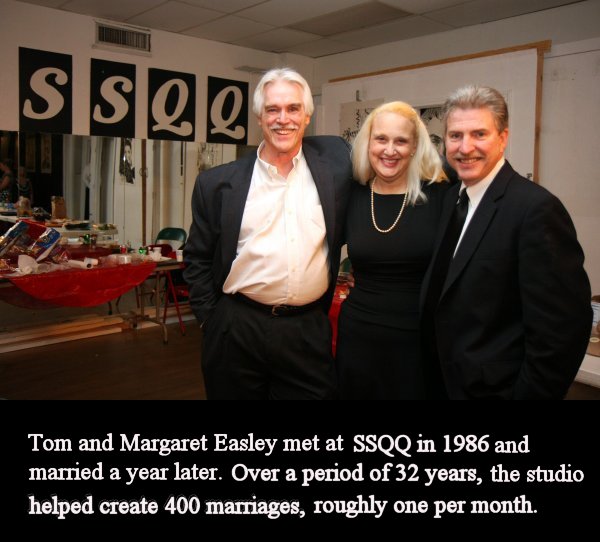 |

 |
I was not the only person who noticed
this phenomenon. Many people sensed the intangible spirit of
warmth that permeated the studio. Now that SSQQ
had gained a reputation as a veritable garden of
love, the ensuing word of mouth was so powerful the
future success of the studio would never be in doubt again.
What was I to make of this good fortune?
Mark Twain once said the two most important
days of your life are the day you are born and the day you
find out why. I had just discovered what he meant.
Using lessons learned from my past, I had designed the
finest wedding assembly line imaginable. Full of awe,
I was certain this wedding phenomenon as well as the
enduring spirit of friendship was the reason God had placed
me here.
This
was my "Walking with
Destiny" moment.
"I felt as if I were walking with
Destiny, and that all my past life had been but a
preparation for this hour and for this trial."
-- Winston Churchill
Given the severity of my
childhood handicaps, my
future accomplishments made little
sense. However,
when Fate is
involved, anything is possible.
At the time of my
revelation, I firmly
believed I had been
prepared by my difficult past to know exactly what
to do when the time came. Thank you, St.
Johns, for giving me a fighting chance. Using
lessons taught to
me by Mr. Salls and Mrs. Ballantyne,
I dedicated my life to "Pay it
Forward".
|
In my heart I cannot shake the
feeling that Mrs. Ballantyne was
sent to my side that day to put
me out of my suffering. No
other explanation makes a bit of
sense.
I love the
Parking Lot story because it
felt like a mystical experience
at the time. In the years
since, my conviction has become
unshakeable.
The easiest way to explain the
impact of Mrs. Ballantyne's visit would be to compare it to
Clarence, the angel in
Jimmy Stewart's "Wonderful Life".
During my crisis, I needed
Maria
Ballantyne as much as George Bailey needed Clarence.
Crippled by a series of tough breaks,
I responded
to her encouragement as
a wounded person would
to
a kind soul who
offers
a healing touch.
As rescues go, they do
not get better than this. I was a beaten kid
convinced he was the bigger loser on earth.
It was just my Luck the
most talented mother I knew just happened to show up.
I do not believe this was an accident.
I am
convinced Maria Ballantyne was sent to my
side by the Hidden Hand of God.
|
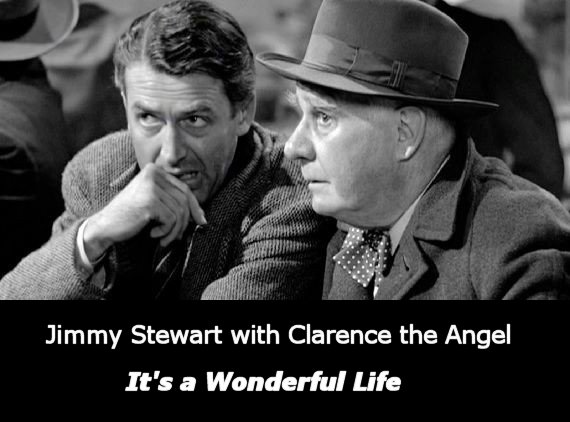 |
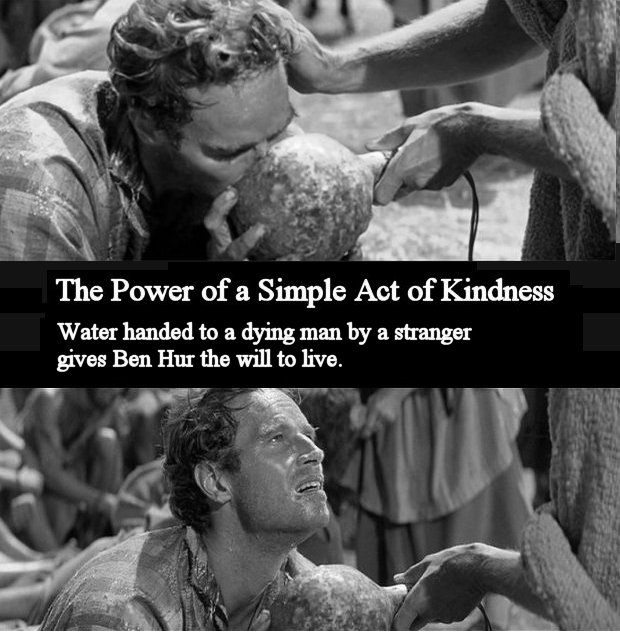 |
Why do some people get up
while others stay down? Based on my own experience, I contend
the answer might boil down to an unexpected Helping Hand. In the movie
Ben Hur, Judah Ben-Hur was bound and chained en route to
become a slave in
the Roman galleys. He
was cruelly denied water by the guards as he crossed the hot desert sands. Dying of thirst in
the
extreme heat, Ben Hur collapsed.
On the ground near death, Ben
Hur whispered, "God, please
help me..."
Seconds later, a
man
came to him and gave him water. A nearby Roman soldier stared in
disbelief at this bold act of
defiance. An instant
later, the guard cowered in
recognition of the divinity of Jesus. Jesus
had
appeared out of nowhere to offer a bowl of water to a suffering man
full of despair. This powerful moment gave
Ben Hur the courage he needed to continue on despite an absolutely
hopeless situation.
Now the
cynical among us scoff and say
something this preposterous does
not happen in real life.
Guess what? I am living
proof that it
does happen. An Act of Kindness can
make a profound difference in the life of a crippled person.
When Mrs. Ballantyne rescued me in high school, her appearance
reminded me of this exact scene
in Ben Hur.
Looking back, I believe
it was my Fate to be placed in a very deep hole at the start of my
life. Then, like
Ben Hur, people were sent to help me climb out
of that hole.
Their
unexpected Acts of Kindness
allowed me to overcome my handicaps.
Why were Helping
Hands extended to me and not to others? I do not possess the
wisdom to know the answer. All I can say is that when things
were at their most dire, Maria Ballantyne
handed me a bowl of water.
Given a fresh start, I vowed to share the
power of "A
Simple Act of Kindness" with
others whenever given the
chance. In this way I
could ensure Maria's message
would "echo
on for generations to come".
|
|
|
REGARDING "PAY IT FORWARD"
|
Rick Archer's
Note:
I have explained how
I learned the
importance of "A
Simple Act of Kindness"
thanks to the charismatic
Maria Ballantyne.
We
also learned that a
Galveston gangster named Sam
Maceo paid Maria's way to
college. This was the lucky break
that changed the direction
of her life. Maria was
so grateful that she would
hold Galveston's Godfather
in reverence for the rest of
her life.
As it
turned out, Sam Maceo
performed a similar "Act
of Kindness" for
someone else. The
recipient was so profoundly
moved by Maceo's generosity
that later in life this man took a
ruined city - Galveston -
and singlehandedly restored
it to prosperity.
What
you have read is a condensed
version of an eight chapter
book. If you would
like to read the full story,
by all means let me know and
I let you read it on the
Internet at no charge.
Thank
you for reading.
Rick Archer
rick@ssqq.com
|
|
|
|